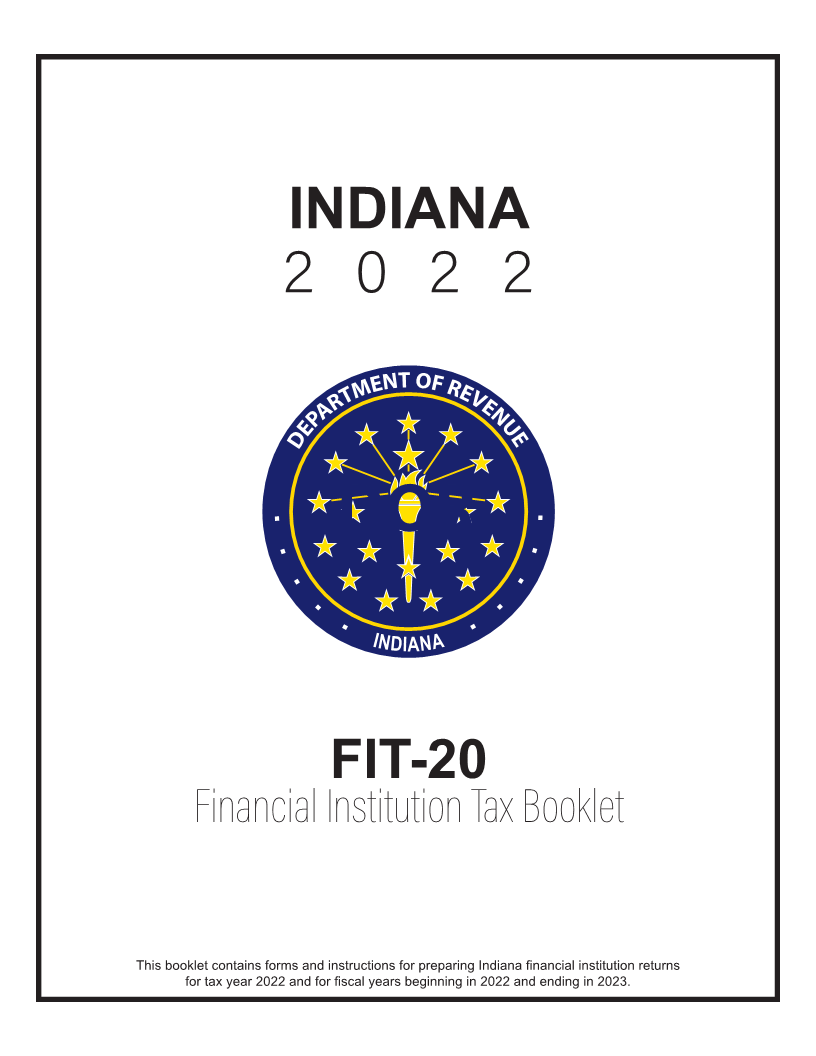
Enlarge image
INDIANA 2 02 2 FIT-20 Financial Institution Tax Booklet This booklet contains forms and instructions for preparing Indiana financial institution returns for tax year 2022 and for fiscal years beginning in 2022 and ending in 2023.
 Enlarge image | INDIANA 2 02 2 FIT-20 Financial Institution Tax Booklet This booklet contains forms and instructions for preparing Indiana financial institution returns for tax year 2022 and for fiscal years beginning in 2022 and ending in 2023. |
 Enlarge image |
SP 244
(R20 / 8-22)
Page 2 FIT-20 Financial Institution Booklet 2022
|
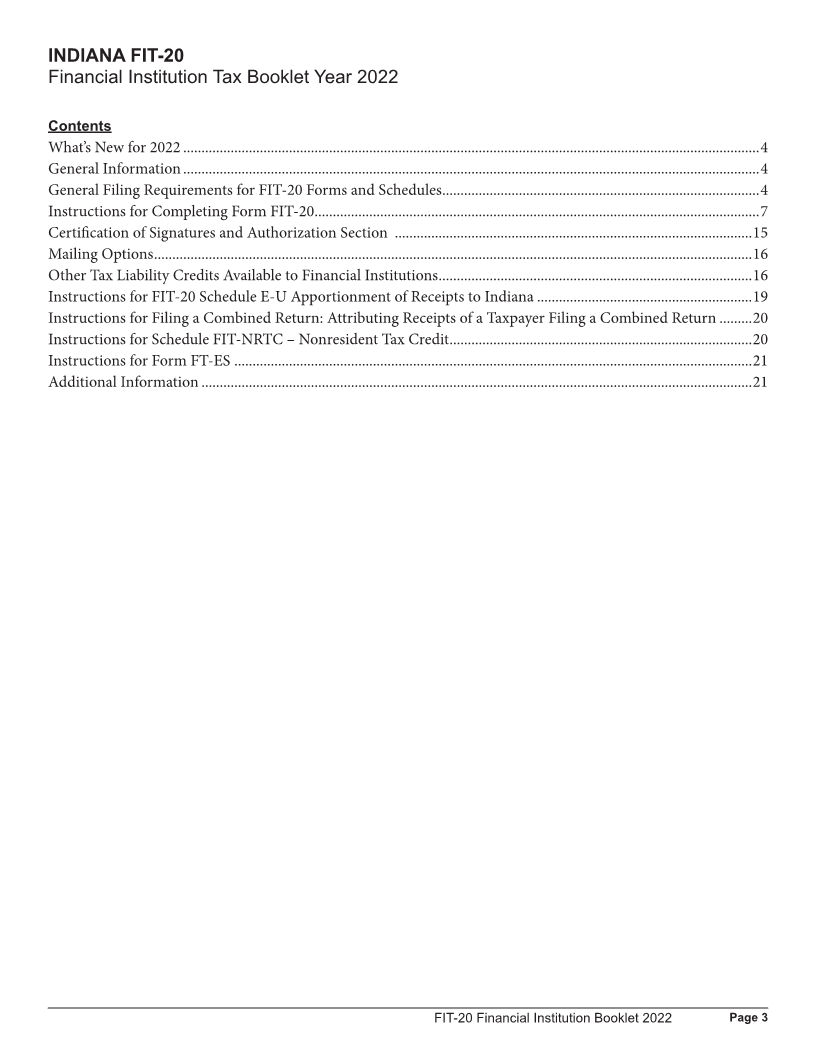 Enlarge image |
INDIANA FIT-20
Financial Institution Tax Booklet Year 2022
Contents
What’s New for 2022 ..............................................................................................................................................................4
General Information ..............................................................................................................................................................4
General Filing Requirements for FIT-20 Forms and Schedules .......................................................................................4
Instructions for Completing Form FIT-20 ..........................................................................................................................7
Certification of Signatures and Authorization Section ..................................................................................................15
Mailing Options ....................................................................................................................................................................16
Other Tax Liability Credits Available to Financial Institutions ......................................................................................16
Instructions for FIT-20 Schedule E-U Apportionment of Receipts to Indiana ...........................................................19
Instructions for Filing a Combined Return: Attributing Receipts of a Taxpayer Filing a Combined Return .........20
Instructions for Schedule FIT-NRTC – Nonresident Tax Credit ...................................................................................20
Instructions for Form FT-ES ..............................................................................................................................................21
Additional Information .......................................................................................................................................................21
FIT-20 Financial Institution Booklet 2022 Page 3
|
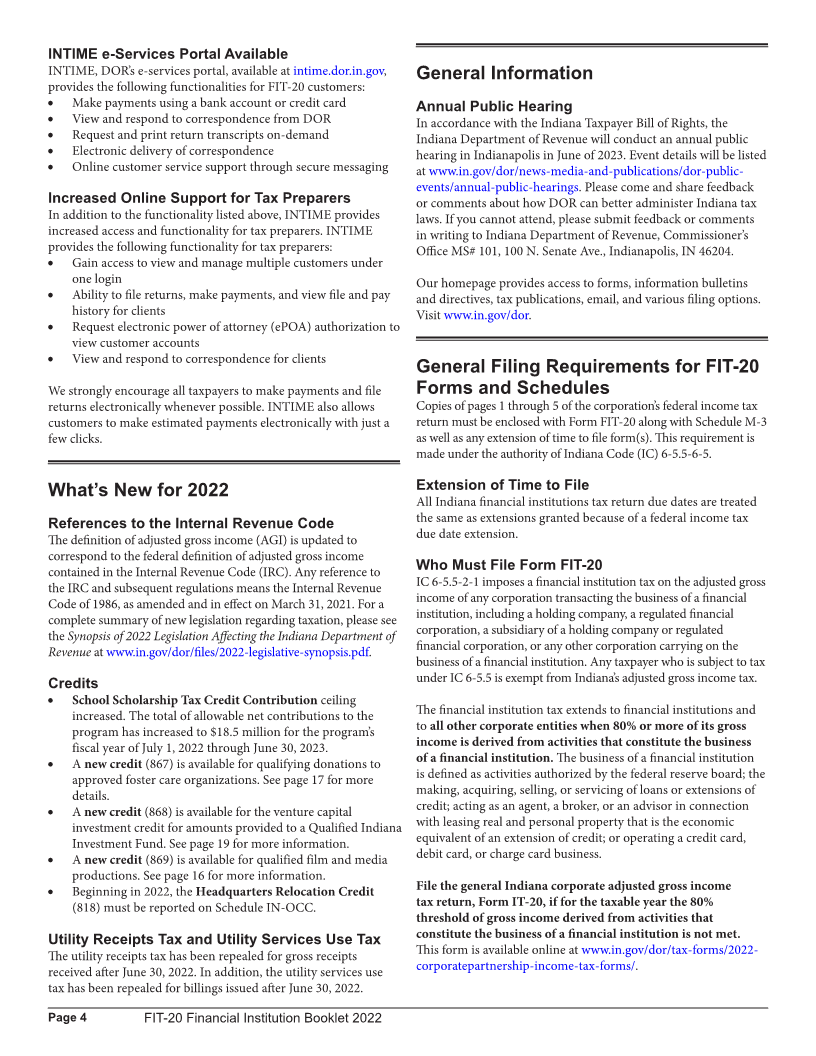 Enlarge image |
INTIME e-Services Portal Available
INTIME, DOR’s e-services portal, available at intime.dor.in.gov, General Information
provides the following functionalities for FIT-20 customers:
• Make payments using a bank account or credit card Annual Public Hearing
• View and respond to correspondence from DOR In accordance with the Indiana Taxpayer Bill of Rights, the
• Request and print return transcripts on-demand Indiana Department of Revenue will conduct an annual public
• Electronic delivery of correspondence hearing in Indianapolis in June of 2023. Event details will be listed
• Online customer service support through secure messaging at www.in.gov/dor/news-media-and-publications/dor-public-
events/annual-public-hearings. Please come and share feedback
Increased Online Support for Tax Preparers or comments about how DOR can better administer Indiana tax
In addition to the functionality listed above, INTIME provides laws. If you cannot attend, please submit feedback or comments
increased access and functionality for tax preparers. INTIME in writing to Indiana Department of Revenue, Commissioner’s
provides the following functionality for tax preparers: Office MS# 101, 100 N. Senate Ave., Indianapolis, IN 46204.
• Gain access to view and manage multiple customers under
one login Our homepage provides access to forms, information bulletins
• Ability to file returns, make payments, and view file and pay and directives, tax publications, email, and various filing options.
history for clients Visit www.in.gov/dor.
• Request electronic power of attorney (ePOA) authorization to
view customer accounts
• View and respond to correspondence for clients
General Filing Requirements for FIT-20
We strongly encourage all taxpayers to make payments and file Forms and Schedules
returns electronically whenever possible. INTIME also allows Copies of pages 1 through 5 of the corporation’s federal income tax
customers to make estimated payments electronically with just a return must be enclosed with Form FIT-20 along with Schedule M-3
few clicks. as well as any extension of time to file form(s). This requirement is
made under the authority of Indiana Code (IC) 6-5.5-6-5.
Extension of Time to File
What’s New for 2022
All Indiana financial institutions tax return due dates are treated
the same as extensions granted because of a federal income tax
References to the Internal Revenue Code
The definition of adjusted gross income (AGI) is updated to due date extension.
correspond to the federal definition of adjusted gross income
contained in the Internal Revenue Code (IRC). Any reference to Who Must File Form FIT-20
the IRC and subsequent regulations means the Internal Revenue IC 6-5.5-2-1 imposes a financial institution tax on the adjusted gross
Code of 1986, as amended and in effect on March 31, 2021. For a income of any corporation transacting the business of a financial
complete summary of new legislation regarding taxation, please see institution, including a holding company, a regulated financial
the Synopsis of 2022 Legislation Affecting the Indiana Department of corporation, a subsidiary of a holding company or regulated
Revenue at www.in.gov/dor/files/2022-legislative-synopsis.pdf. financial corporation, or any other corporation carrying on the
business of a financial institution. Any taxpayer who is subject to tax
under IC 6-5.5 is exempt from Indiana’s adjusted gross income tax.
Credits
• School Scholarship Tax Credit Contribution ceiling
increased. The total of allowable net contributions to the The financial institution tax extends to financial institutions and
program has increased to $18.5 million for the program’s to all other corporate entities when 80% or more of its gross
fiscal year of July 1, 2022 through June 30, 2023. income is derived from activities that constitute the business
• A new credit (867) is available for qualifying donations to of a financial institution. The business of a financial institution
approved foster care organizations. See page 1 7 for more is defined as activities authorized by the federal reserve board; the
details. making, acquiring, selling, or servicing of loans or extensions of
• A new credit (868) is available for the venture capital credit; acting as an agent, a broker, or an advisor in connection
investment credit for amounts provided to a Qualified Indiana with leasing real and personal property that is the economic
Investment Fund. See page 1 9 for more information. equivalent of an extension of credit; or operating a credit card,
• A new credit (869) is available for qualified film and media debit card, or charge card business.
productions. See page 1 6for more information.
• Beginning in 2022, the Headquarters Relocation Credit File the general Indiana corporate adjusted gross income
(818) must be reported on Schedule IN-OCC. tax return, Form IT-20, if for the taxable year the 80%
threshold of gross income derived from activities that
constitute the business of a financial institution is not met.
Utility Receipts Tax and Utility Services Use Tax
The utility receipts tax has been repealed for gross receipts This form is available online at www.in.gov/dor/tax-forms/2022-
received after June 30, 2022. In addition, the utility services use corporatepartnership-income-tax-forms/.
tax has been repealed for billings issued after June 30, 2022.
Page 4 FIT-20 Financial Institution Booklet 2022
|
 Enlarge image |
Due Date • Maintaining or defending an action or a suit;
The return due date is the 15th day of the 5th month after the end • Filing, modifying, renewing, extending, or transferring a
of the tax year. mortgage, deed of trust, or security interest;
• Acquiring, foreclosing, or otherwise conveying property in
Apportionment of Adjusted Gross Income Indiana as a result of a default under the terms of a mortgage,
The financial institution tax is imposed on the apportioned deed of trust, or security interest relating to the property;
Indiana income of financial institutions. The law employs a • Selling tangible personal property, if taxation under this law
single-factor receipts formula to determine the percentage of the is precluded because of P.L. 86-272;
taxpayer’s income subject to the tax. The single-factor formula is • Owning an interest in the following types of property
derived by dividing the gross receipts attributable to transacting even though activities are conducted in Indiana that are
business in Indiana by the total receipts from transacting business reasonably required to evaluate and complete the acquisition
in all taxing jurisdictions. or disposition of the property, the servicing of the property,
or the income from the property, or the acquisition or
Nexus Rules liquidation of collateral relating to the property;
The law is based on the ability of a corporation under modern • An interest in a real estate mortgage investment conduit, a
technology to transact the business of a financial institution in real estate investment trust, or a regulated investment
Indiana, regardless of the principal location of its offices and company;
employees. • An interest in a loan-backed security representing ownership
or participation in a pool of promissory notes or certificates
A taxpayer is transacting business in Indiana for purposes of the of interest providing for payments in relation to payments
FIT when it satisfies any of the following eight tests: or reasonable projections of payments on the notes or
• Maintains an office in Indiana; certificates;
• Has an employee, a representative, or an independent • An interest in a loan or other asset where the interest is
contractor conducting business in Indiana; attributed to a consumer loan, commercial loan, or secured
• Regularly sells products or services of any kind or nature to commercial loan and where the payment obligations were
customers in Indiana who receive the product or service in solicited and entered into by a person who is independent
Indiana; and not acting on behalf of the owner;
• Regularly solicits business from potential customers in • An interest in the right to service or collect income from a
Indiana; loan or other asset where interest on the loan is attributed
• Regularly performs services outside Indiana that are as a loan described above and the payment obligations were
consumed within Indiana; solicited and entered into by a person who is independent
• Regularly engages in transactions with customers in Indiana and not acting on behalf of the owner; or
involving intangible property, including loans, but not • An amount held in an escrow or trust account with respect to
property described in IC 6-5.5-3-8(5), and resulting in the property described previously.
receipts flowing to the taxpayer from within Indiana; Acting:
• Owns or leases tangible personal or real property located in • As an executor of an estate;
Indiana; or • As a trustee of a benefit plan;
• Regularly solicits and receives deposits from customers in • As a trustee of an employee’s pension, profit sharing, or other
Indiana. retirement plan;
• As a trustee of a testamentary or inter vivos trust or corporate
A taxpayer is presumed to “regularly” engage in the above indenture; or
activities when its assets attributable to Indiana are equal to at • In any other fiduciary capacity, including holding title to real
least $5 million or it has 20 or more Indiana customers. property in Indiana.
Exempt Entities Method of Reporting
Four specific types of organizations are exempted from the FIT: A taxpayer is allowed to file a separate return only in those
• Insurance companies otherwise subject to tax under instances where the taxpayer is not a member of a unitary
IC 6-3, IC 27-1-2-2.3, or IC 27-1-18-2; group. Members of a unitary group must file collectively on one
• International banking facilities; combined return. No provision is made for filing consolidated
• S corporations exempt from income tax under IRC Section returns.
1363; and
• Nonprofit corporations unless the nonprofit corporation If the taxpayer is a member of a unitary group, combined
has unrelated business income (with the exception of state reporting is mandatory. However, if the taxpayer determines that
chartered credit unions). Federal law prohibits state taxation its Indiana income is not accurately reflected by the filing of a
of federally chartered credit unions. combined return, the taxpayer can petition DOR. Such petition is
subject to approval by DOR. The petition must include the name
Exempt Transactions and federal employer identification number of each member of
A taxpayer is not considered to be transacting business in Indiana the group petitioning for an alternative method. Each member
if the ONLY activities of the taxpayer in Indiana are in connection must include its justification for the alternative method.
with any of the following:
FIT-20 Financial Institution Booklet 2022 Page 5
|
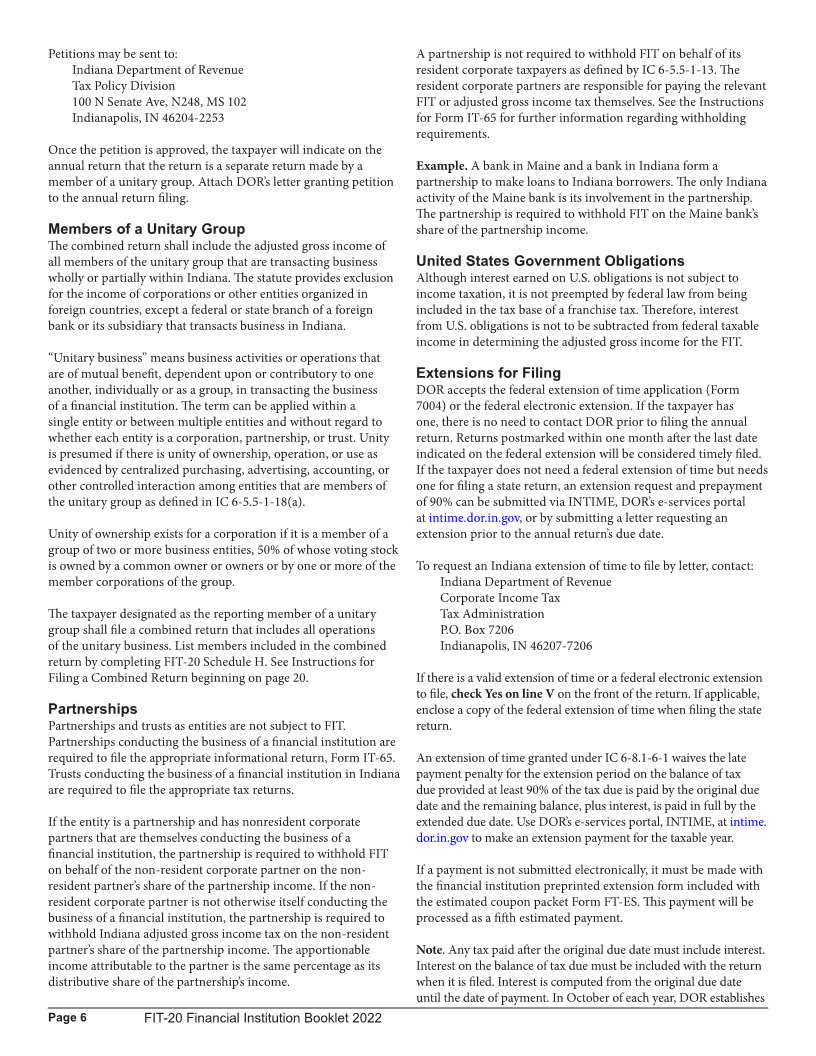 Enlarge image |
Petitions may be sent to: A partnership is not required to withhold FIT on behalf of its
Indiana Department of Revenue resident corporate taxpayers as defined by IC 6-5.5-1-13. The
Tax Policy Division resident corporate partners are responsible for paying the relevant
100 N Senate Ave, N248, MS 102 FIT or adjusted gross income tax themselves. See the Instructions
Indianapolis, IN 46204-2253 for Form IT-65 for further information regarding withholding
requirements.
Once the petition is approved, the taxpayer will indicate on the
annual return that the return is a separate return made by a Example. A bank in Maine and a bank in Indiana form a
member of a unitary group. Attach DOR’s letter granting petition partnership to make loans to Indiana borrowers. The only Indiana
to the annual return filing. activity of the Maine bank is its involvement in the partnership.
The partnership is required to withhold FIT on the Maine bank’s
Members of a Unitary Group share of the partnership income.
The combined return shall include the adjusted gross income of
all members of the unitary group that are transacting business United States Government Obligations
wholly or partially within Indiana. The statute provides exclusion Although interest earned on U.S. obligations is not subject to
for the income of corporations or other entities organized in income taxation, it is not preempted by federal law from being
foreign countries, except a federal or state branch of a foreign included in the tax base of a franchise tax. Therefore, interest
bank or its subsidiary that transacts business in Indiana. from U.S. obligations is not to be subtracted from federal taxable
income in determining the adjusted gross income for the FIT.
“Unitary business” means business activities or operations that
are of mutual benefit, dependent upon or contributory to one Extensions for Filing
another, individually or as a group, in transacting the business DOR accepts the federal extension of time application (Form
of a financial institution. The term can be applied within a 7004) or the federal electronic extension. If the taxpayer has
single entity or between multiple entities and without regard to one, there is no need to contact DOR prior to filing the annual
whether each entity is a corporation, partnership, or trust. Unity return. Returns postmarked within one month after the last date
is presumed if there is unity of ownership, operation, or use as indicated on the federal extension will be considered timely filed.
evidenced by centralized purchasing, advertising, accounting, or If the taxpayer does not need a federal extension of time but needs
other controlled interaction among entities that are members of one for filing a state return, an extension request and prepayment
the unitary group as defined in IC 6-5.5-1-18(a). of 90% can be submitted via INTIME, DOR’s e-services portal
at intime.dor.in.gov, or by submitting a letter requesting an
Unity of ownership exists for a corporation if it is a member of a extension prior to the annual return’s due date.
group of two or more business entities, 50% of whose voting stock
is owned by a common owner or owners or by one or more of the To request an Indiana extension of time to file by letter, contact:
member corporations of the group. Indiana Department of Revenue
Corporate Income Tax
The taxpayer designated as the reporting member of a unitary Tax Administration
group shall file a combined return that includes all operations P.O. Box 7206
of the unitary business. List members included in the combined Indianapolis, IN 46207-7206
return by completing FIT-20 Schedule H. See Instructions for
Filing a Combined Return beginning on page 20. If there is a valid extension of time or a federal electronic extension
to file, check Yes on line V on the front of the return. If applicable,
Partnerships enclose a copy of the federal extension of time when filing the state
Partnerships and trusts as entities are not subject to FIT. return.
Partnerships conducting the business of a financial institution are
required to file the appropriate informational return, Form IT-65. An extension of time granted under IC 6-8.1-6-1 waives the late
Trusts conducting the business of a financial institution in Indiana payment penalty for the extension period on the balance of tax
are required to file the appropriate tax returns. due provided at least 90% of the tax due is paid by the original due
date and the remaining balance, plus interest, is paid in full by the
If the entity is a partnership and has nonresident corporate extended due date. Use DOR’s e-services portal, INTIME, at intime.
partners that are themselves conducting the business of a dor.in.gov to make an extension payment for the taxable year.
financial institution, the partnership is required to withhold FIT
on behalf of the non-resident corporate partner on the non- If a payment is not submitted electronically, it must be made with
resident partner’s share of the partnership income. If the non- the financial institution preprinted extension form included with
resident corporate partner is not otherwise itself conducting the the estimated coupon packet Form FT-ES. This payment will be
business of a financial institution, the partnership is required to processed as a fifth estimated payment.
withhold Indiana adjusted gross income tax on the non-resident
partner’s share of the partnership income. The apportionable Note. Any tax paid after the original due date must include interest.
income attributable to the partner is the same percentage as its Interest on the balance of tax due must be included with the return
distributive share of the partnership’s income. when it is filed. Interest is computed from the original due date
until the date of payment. In October of each year, DOR establishes
Page 6 FIT-20 Financial Institution Booklet 2022
|
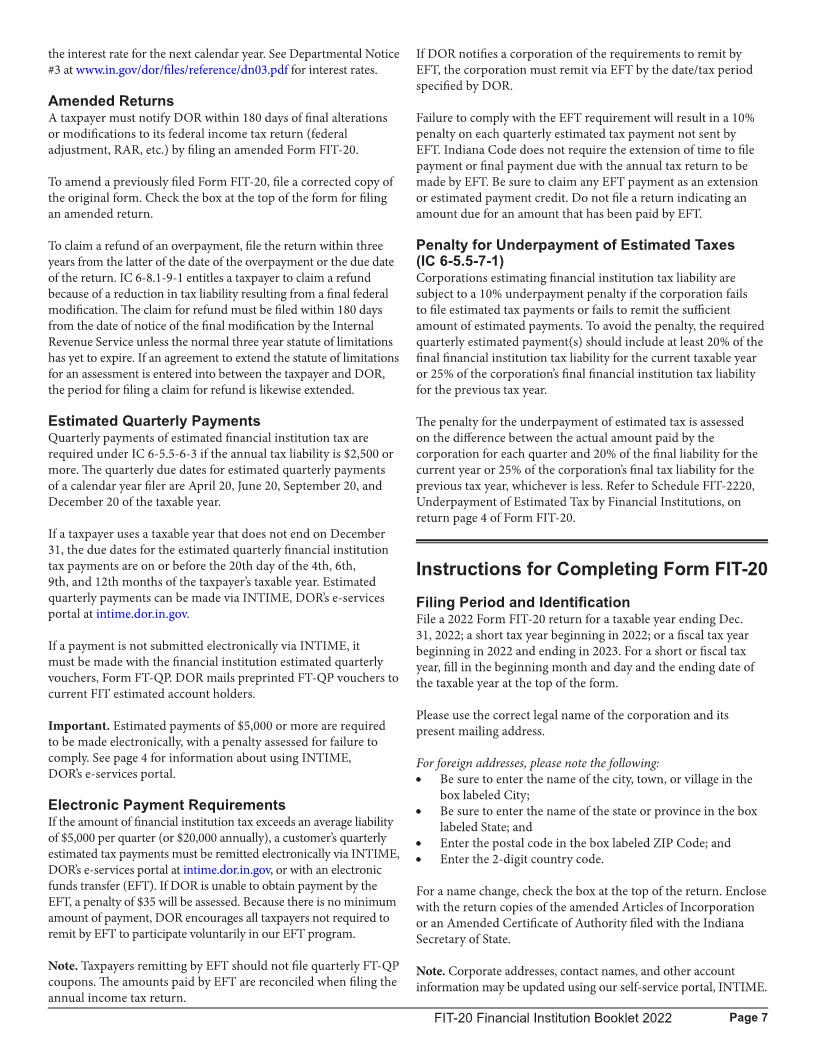 Enlarge image |
the interest rate for the next calendar year. See Departmental Notice If DOR notifies a corporation of the requirements to remit by
#3 at www.in.gov/dor/files/reference/dn03.pdf for interest rates. EFT, the corporation must remit via EFT by the date/tax period
specified by DOR.
Amended Returns
A taxpayer must notify DOR within 180 days of final alterations Failure to comply with the EFT requirement will result in a 10%
or modifications to its federal income tax return (federal penalty on each quarterly estimated tax payment not sent by
adjustment, RAR, etc.) by filing an amended Form FIT-20. EFT. Indiana Code does not require the extension of time to file
payment or final payment due with the annual tax return to be
To amend a previously filed Form FIT-20, file a corrected copy of made by EFT. Be sure to claim any EFT payment as an extension
the original form. Check the box at the top of the form for filing or estimated payment credit. Do not file a return indicating an
an amended return. amount due for an amount that has been paid by EFT.
To claim a refund of an overpayment, file the return within three Penalty for Underpayment of Estimated Taxes
years from the latter of the date of the overpayment or the due date (IC 6-5.5-7-1)
of the return. IC 6-8.1-9-1 entitles a taxpayer to claim a refund Corporations estimating financial institution tax liability are
because of a reduction in tax liability resulting from a final federal subject to a 10% underpayment penalty if the corporation fails
modification. The claim for refund must be filed within 180 days to file estimated tax payments or fails to remit the sufficient
from the date of notice of the final modification by the Internal amount of estimated payments. To avoid the penalty, the required
Revenue Service unless the normal three year statute of limitations quarterly estimated payment(s) should include at least 20% of the
has yet to expire. If an agreement to extend the statute of limitations final financial institution tax liability for the current taxable year
for an assessment is entered into between the taxpayer and DOR, or 25% of the corporation’s final financial institution tax liability
the period for filing a claim for refund is likewise extended. for the previous tax year.
Estimated Quarterly Payments The penalty for the underpayment of estimated tax is assessed
Quarterly payments of estimated financial institution tax are on the difference between the actual amount paid by the
required under IC 6-5.5-6-3 if the annual tax liability is $2,500 or corporation for each quarter and 20% of the final liability for the
more. The quarterly due dates for estimated quarterly payments current year or 25% of the corporation’s final tax liability for the
of a calendar year filer are April 20, June 20, September 20, and previous tax year, whichever is less. Refer to Schedule FIT-2220,
December 20 of the taxable year. Underpayment of Estimated Tax by Financial Institutions, on
return page 4 of Form FIT-20.
If a taxpayer uses a taxable year that does not end on December
31, the due dates for the estimated quarterly financial institution
tax payments are on or before the 20th day of the 4th, 6th,
Instructions for Completing Form FIT-20
9th, and 12th months of the taxpayer’s taxable year. Estimated
quarterly payments can be made via INTIME, DOR’s e-services Filing Period and Identification
portal at intime.dor.in.gov. File a 2022 Form FIT-20 return for a taxable year ending Dec.
31, 2022; a short tax year beginning in 2022; or a fiscal tax year
If a payment is not submitted electronically via INTIME, it beginning in 2022 and ending in 2023. For a short or fiscal tax
must be made with the financial institution estimated quarterly year, fill in the beginning month and day and the ending date of
vouchers, Form FT-QP. DOR mails preprinted FT-QP vouchers to the taxable year at the top of the form.
current FIT estimated account holders.
Please use the correct legal name of the corporation and its
Important. Estimated payments of $5,000 or more are required present mailing address.
to be made electronically, with a penalty assessed for failure to
comply. See page 4 for information about using INTIME, For foreign addresses, please note the following:
DOR’s e-services portal. • Be sure to enter the name of the city, town, or village in the
box labeled City;
Electronic Payment Requirements • Be sure to enter the name of the state or province in the box
If the amount of financial institution tax exceeds an average liability labeled State; and
of $5,000 per quarter (or $20,000 annually), a customer’s quarterly • Enter the postal code in the box labeled ZIP Code; and
estimated tax payments must be remitted electronically via INTIME, • Enter the 2-digit country code.
DOR’s e-services portal at intime.dor.in.gov, or with an electronic
funds transfer (EFT). If DOR is unable to obtain payment by the For a name change, check the box at the top of the return. Enclose
EFT, a penalty of $35 will be assessed. Because there is no minimum with the return copies of the amended Articles of Incorporation
amount of payment, DOR encourages all taxpayers not required to or an Amended Certificate of Authority filed with the Indiana
remit by EFT to participate voluntarily in our EFT program. Secretary of State.
Note. Taxpayers remitting by EFT should not file quarterly FT-QP Note. Corporate addresses, contact names, and other account
coupons. The amounts paid by EFT are reconciled when filing the information may be updated using our self-service portal, INTIME.
annual income tax return.
FIT-20 Financial Institution Booklet 2022 Page 7
|
 Enlarge image |
The federal employer identification number (FEIN) shown in the Line 5. Enter the amount deducted for bad debt reserves of banks
box must be correct. (IRC Sec. 585).
List the two-digit county code if filing a return for a corporate Line 6. Enter the amount deducted for bad debt reserves (IRC
address in Indiana. See Departmental Notice #1 located at www. Sec. 593).
in.gov/dor/files/reference/dn01.pdf for a list of county codes.
Enter “00” (two zeroes) in the county box D if corporate address Line 7. Enter the amount deducted for charitable contributions
lies outside of Indiana. (IRC Sec. 170).
Enter the principal business activity code, derived from the Line 8. Enter the amount deducted on the federal return for all state
North American Industry Classification System (NAICS), in the and local taxes based on or measured by income (IRC Sec. 63).
designated block of the return. Use the six-digit activity code as
reported on the federal corporation return. Line 9. Enter an amount equal to the capital loss carryover (from
federal Schedule D: line 6, minus line 18 loss amount) to the
Lines L through W of the FIT-20 must be completed for the extent used in offsetting capital gains allowed under IRC Section
return to be accepted by DOR. Check or complete all boxes that 1212. See the instructions to line 23 for subtracting the amount
apply to the return. deductible for Indiana net capital losses.
Check the “final return” box only if the corporation is dissolved, Line 10. Enter the amount of interest on state and local
liquidated, or has withdrawn from the state. Timely file Form BC- obligations excluded under IRC Section 103, or under any other
100 to close out any sales and withholding accounts. Complete these federal law, minus the associated expenses disallowed in the
online at www.in.gov/dor/business-tax/closing-a-business-account/. computation of taxable income under IRC Section 265.
Check the appropriate box if filing as a real estate mortgage Lines 11 A, B, C, and D. Other Income Modifications
investment conduit (REMIC). Note. The return for a REMIC is Enclose a complete explanation for adjustments.
due on the 15th day of the 4th month following the close of the
taxpayer’s tax year. Line 11A. Add or subtract an amount equal to the amount claimed
as a deduction for excess business interest. If a deduction for
Indicate on line Vif an extension of time to file is in effect. If interest paid or incurred in the current year has been disallowed
applicable, enclose a copy of federal Form 7004 when filing the under IRC Section 163(j), subtract the amount of interest
state return. disallowed in the current year. If you have interest that was actually
paid or incurred in a previous taxable year but disallowed for
Schedule A – Line Instructions federal purposes due to the limitations under IRC Section 163(j)
Per IC 6-8.1-6-4.5, round amounts to the nearest whole dollar. AND deducted for federal purposes in the current taxable year,
Each line on which an amount can be entered has a “.00” already add back the amount of interest so deducted for federal purposes.
filled in. This is a reminder that rounding is now required when
completing the tax return. Line 11B. Add or subtract an amount attributable to bonus
depreciation in excess of any regular depreciation that would be
Also, do not use a comma in dollar amounts of four digits or allowed had not an election under IRC Section 168(k) been made
more. For example, instead of entering “3,455” enter “3455.” as applied to property in the year that it was placed into service.
Taxpayers who own property for which additional first-year
Line 1. Enter federal taxable income from Federal Form 1120 special depreciation for qualified property, including 100% bonus
before the net operating loss deduction or the special federal depreciation, was allowed in the current taxable year or in an
deduction. earlier taxable year, must add or subtract an amount necessary
to make adjusted gross income equal to the amount computed
Note. If filing as a state-chartered credit union or an investment without applying any bonus depreciation. The subsequent
company registered under the Investment Company Act of 1940, depreciation allowance is to be calculated as if no bonus
proceed to line 19 to enter adjusted gross income as defined under depreciation had been claimed until the property is disposed or
IC 6-5.5-1-2(b) and(c). the property is fully depreciated for Indiana purposes. If line 11B’s
amount is negative, use a minus sign to denote that.
Line 2. Enter the qualifying dividend deduction.
Special rules may apply if the bonus depreciation is taken against
Line 3. Subtract line 2 from line 1. property acquired in a like-kind exchange. See Income Tax
Information Bulletin #118 at www.in.gov/dor/files/reference/
Add backs: Lines 4 through 10. ib118.pdf for additional information.
Line 4. Enter the amount deducted for bad debt (IRC Sec. 166).
See line 16 to report recovery of a previously reported worthless The additional regular depreciation may be excluded in subsequent
debt to the extent a deduction was allowed from gross income in a years from the amounts to be added back on line 11B, or 11C
prior tax year under IRC Sec. 166(a). when excess IRC Section 179 deduction or bonus depreciation was
elected for assets placed in service in those subsequent years.
Page 8 FIT-20 Financial Institution Booklet 2022
|
 Enlarge image |
See Income Tax Information Bulletin #118 available at www. for federal purposes that exceeded the amount allowable for
in.gov/dor/files/reference/ib118.pdf for information on the Indiana purposes. The accumulated depreciation on such an asset
allowance of depreciation for state tax purposes. through 2012 is, therefore, different for federal and state purposes.
This difference will remain until the asset is fully depreciated or
Line 11C. Add or subtract the amount necessary to make the until the time of its disposition.
adjusted gross income of the taxpayer that placed any IRC Section
179 property in service in the current taxable year or in an earlier So, in this example, the asset was acquired in January 2009 at a
taxable year equal to the amount of adjusted gross income that purchase price of $120,000. This normally would have a 25-year
would have been computed as if the federal limit for expensing recovery period, but IRC Sec. 168 allows for a 15-year recovery
under IRC section 179 was $25,000 as opposed to $1,000,000 period. Tax year 2012 is the last year ABC Company will have
(adjusted for inflation). reported a qualified restaurant equipment add-back until the end
of the 15-year recovery period.
Indiana has adopted an expensing cap of $25,000. This
modification affects the basis of the property if a higher Section If this asset was sold before being fully depreciated, the catch-up
179 limit was applied. The federal increase to a $1,000,000 modification would be reflected in the year of the sale. However, if
deduction was not allowed for purposes of calculating Indiana this property is held through 2023 (the 15th year of depreciation),
adjusted gross income. However, the $2,500,000 threshold for ABC Company will report a negative $9,600 catch-up add-back
phase-out (adjusted for inflation) is allowed for purposes of on the 2023 state tax return.
calculating Indiana AGI. The depreciation allowances in the
year of purchase and in later years must be adjusted to reflect The following add-backs and deductions should be entered on
the additional first-year depreciation deduction, including the lines 12A through 12D:
special depreciation allowance for 100% bonus depreciation
property, until the property is sold or fully depreciated for Indiana Meal Deduction Add-Back (3-digit code: 149)
purposes. If you:
• claimed a deduction for meal expenses with regard to food
Special rules may apply if the Section 179 expensing is taken and beverages provided by a restaurant in computing your
against property acquired in a like-kind exchange. See Income federal taxable income; AND
Tax Information Bulletin #118 at www.in.gov/dor/files/reference/ • the deduction would have been limited to 50% of the meal
ib118.pdf for additional information. expenses if the expenses had been incurred before Jan. 1, 2021,
add back the amount deducted for federal purposes in excess of
Note. The net amount determined for the net bonus depreciation 50% of the food or beverage expenses.
or the IRC Section 179 add-back might be a negative figure
(because of a higher depreciation basis in subsequent years). If Do not add back any amounts for which an exception to the 50%
it is, use a minus sign to denote that. (If the taxable income is a limitation was in effect for amounts paid before Jan. 1, 2021.
loss, this adjustment increases a loss when added back.) Enclose a
statement to explain the adjustment. Example. Bank, Inc. incurs $2,000 in meal expenses during 2022
and deducts the entire $2,000 in computing Bank, Inc.’s 2022
Line 11D. Deduct the amount of income from qualified utility federal taxable income. The meal expenses do not qualify for a
and plant patents included in federal taxable income as permitted federal exception from the 50% limitation under IRC § 274. Bank,
under IC 6-3-2-21.7. Note. Use a minus sign to denote the Inc., is required to add back $1,000.
negative amount. For tax years beginning after Dec. 31, 2007, a
portion of this income is exempt from Indiana AGI. For more Government or Civic Group Capital Contribution Deduction
information, see Income Tax Information Bulletin #104 available (3-digit code: 633)
at www.in.gov/dor/files/reference/ib104.pdf. Subtract any amount included in federal taxable income that are
capital contributions from a government or civic group and not
Lines 12 A, B, C, and D. Total Add-Backs excluded under IRC Section 118.
Enter any add-backs and deductions on lines 12A through 12D.
Enter the name of the add-back/deduction, its 3-digit code, and COVID-related Employee Retention Credit Disallowed
its amount. Use a minus sign to denote a negative amount. Attach Expenses Deduction (3-digit code: 634)
additional sheets if necessary. If you had a deduction that was disallowed for federal purposes
because an employer claimed a federal COVID-related employee
Adding Back Depreciation Expenses retention credit, deduct the amount that was:
Several of the discontinued add-backs were created by timing • disallowed for federal purposes; and
differences between federal and Indiana allowable expenses. • that otherwise would have been allowable in determining
Following is an example of how to report a difference: Indiana adjusted gross income.
Example. ABC Company has qualified restaurant equipment. For Do not deduct any amounts for amounts disallowed for non-
federal tax purposes, they use the accelerated 15-year recovery COVID related employee retention credits such as disaster-related
period for an asset placed in service in 2009. Since 2009, ABC employee retention credits.
Company has been adding back the depreciation expense taken
FIT-20 Financial Institution Booklet 2022 Page 9
|
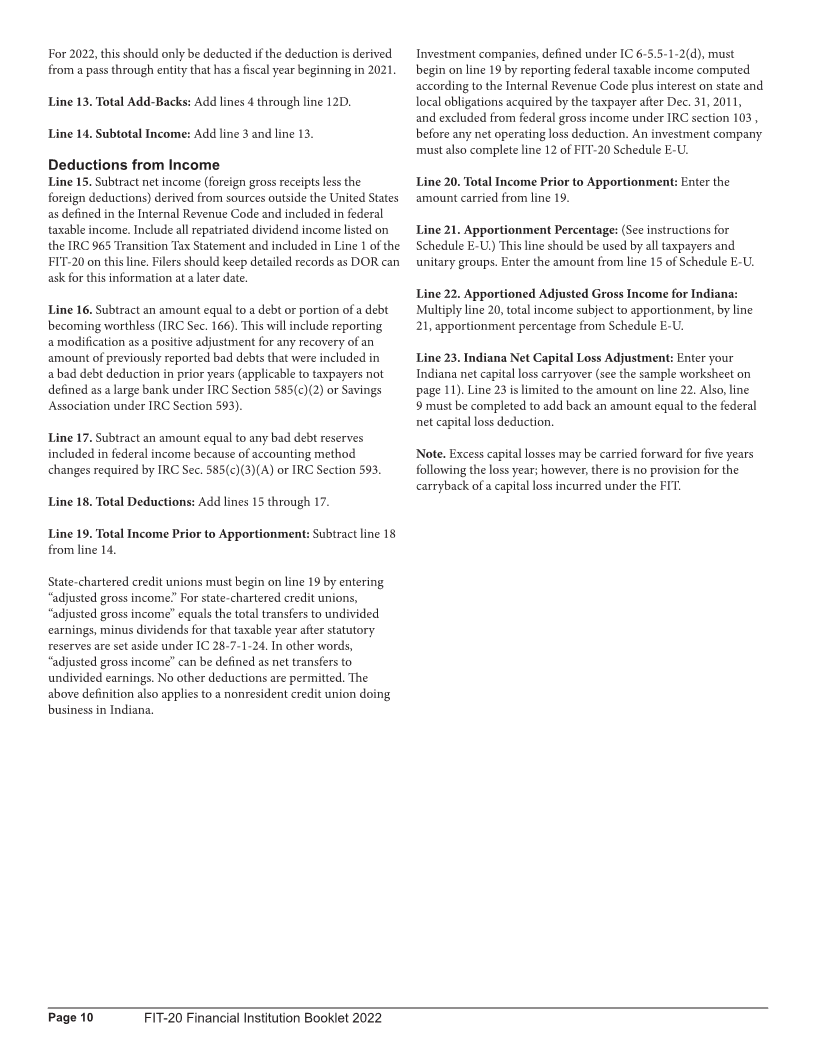 Enlarge image |
For 2022, this should only be deducted if the deduction is derived Investment companies, defined under IC 6-5.5-1-2(d), must
from a pass through entity that has a fiscal year beginning in 2021. begin on line 19 by reporting federal taxable income computed
according to the Internal Revenue Code plus interest on state and
Line 13. Total Add-Backs: Add lines 4 through line 12D. local obligations acquired by the taxpayer after Dec. 31, 2011,
and excluded from federal gross income under IRC section 103 ,
Line 14. Subtotal Income: Add line 3 and line 13. before any net operating loss deduction. An investment company
must also complete line 12 of FIT-20 Schedule E-U.
Deductions from Income
Line 15. Subtract net income (foreign gross receipts less the Line 20. Total Income Prior to Apportionment: Enter the
foreign deductions) derived from sources outside the United States amount carried from line 19.
as defined in the Internal Revenue Code and included in federal
taxable income. Include all repatriated dividend income listed on Line 21. Apportionment Percentage: (See instructions for
the IRC 965 Transition Tax Statement and included in Line 1 of the Schedule E-U.) This line should be used by all taxpayers and
FIT-20 on this line. Filers should keep detailed records as DOR can unitary groups. Enter the amount from line 15 of Schedule E-U.
ask for this information at a later date.
Line 22. Apportioned Adjusted Gross Income for Indiana:
Line 16. Subtract an amount equal to a debt or portion of a debt Multiply line 20, total income subject to apportionment, by line
becoming worthless (IRC Sec. 166). This will include reporting 21, apportionment percentage from Schedule E-U.
a modification as a positive adjustment for any recovery of an
amount of previously reported bad debts that were included in Line 23. Indiana Net Capital Loss Adjustment: Enter your
a bad debt deduction in prior years (applicable to taxpayers not Indiana net capital loss carryover (see the sample worksheet on
defined as a large bank under IRC Section 585(c)(2) or Savings page 11). Line 23 is limited to the amount on line 22. Also, line
Association under IRC Section 593). 9 must be completed to add back an amount equal to the federal
net capital loss deduction.
Line 17. Subtract an amount equal to any bad debt reserves
included in federal income because of accounting method Note. Excess capital losses may be carried forward for five years
changes required by IRC Sec. 585(c)(3)(A) or IRC Section 593. following the loss year; however, there is no provision for the
carryback of a capital loss incurred under the FIT.
Line 18. Total Deductions: Add lines 15 through 17.
Line 19. Total Income Prior to Apportionment: Subtract line 18
from line 14.
State-chartered credit unions must begin on line 19 by entering
“adjusted gross income.” For state-chartered credit unions,
“adjusted gross income” equals the total transfers to undivided
earnings, minus dividends for that taxable year after statutory
reserves are set aside under IC 28-7-1-24. In other words,
“adjusted gross income” can be defined as net transfers to
undivided earnings. No other deductions are permitted. The
above definition also applies to a nonresident credit union doing
business in Indiana.
Page 10 FIT-20 Financial Institution Booklet 2022
|
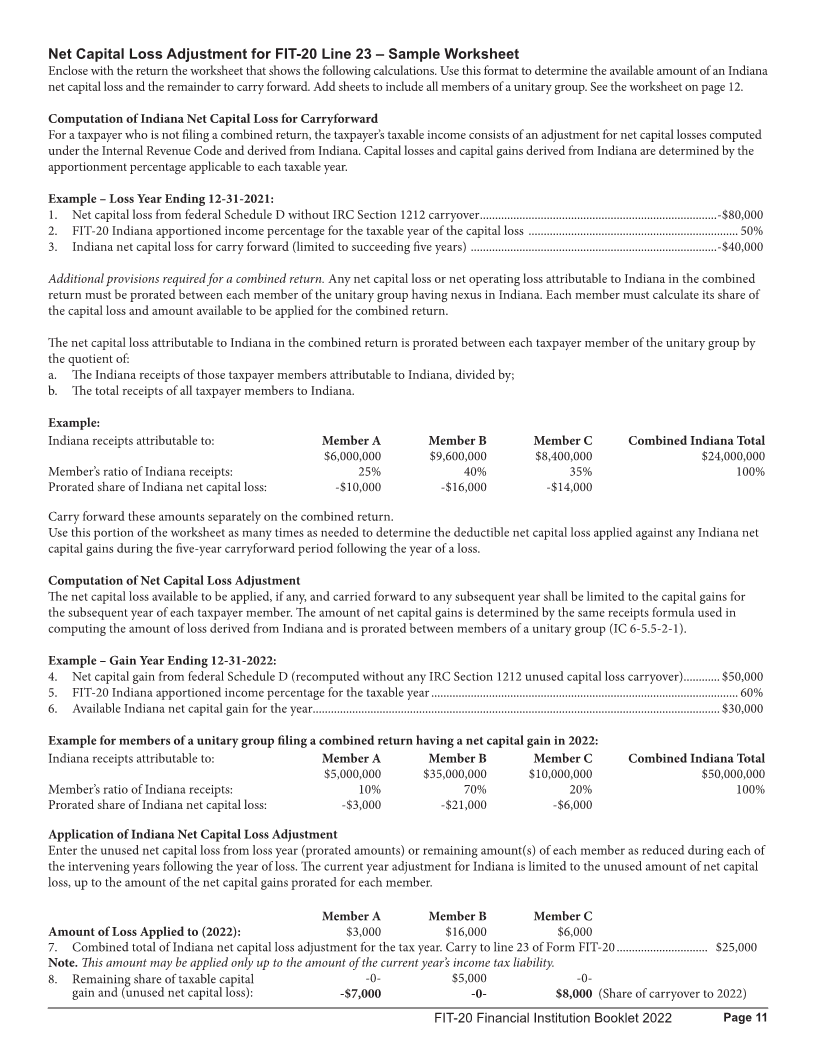 Enlarge image |
Net Capital Loss Adjustment for FIT-20 Line 23 – Sample Worksheet
Enclose with the return the worksheet that shows the following calculations. Use this format to determine the available amount of an Indiana
net capital loss and the remainder to carry forward. Add sheets to include all members of a unitary group. See the worksheet on page 12.
Computation of Indiana Net Capital Loss for Carryforward
For a taxpayer who is not filing a combined return, the taxpayer’s taxable income consists of an adjustment for net capital losses computed
under the Internal Revenue Code and derived from Indiana. Capital losses and capital gains derived from Indiana are determined by the
apportionment percentage applicable to each taxable year.
Example – Loss Year Ending 12-31-2021:
1. Net capital loss from federal Schedule D without IRC Section 1212 carryover ..............................................................................-$80,000
2. FIT-20 Indiana apportioned income percentage for the taxable year of the capital loss ..................................................................... 50%
3. Indiana net capital loss for carry forward (limited to succeeding five years) .................................................................................-$40,000
Additional provisions required for a combined return. Any net capital loss or net operating loss attributable to Indiana in the combined
return must be prorated between each member of the unitary group having nexus in Indiana. Each member must calculate its share of
the capital loss and amount available to be applied for the combined return.
The net capital loss attributable to Indiana in the combined return is prorated between each taxpayer member of the unitary group by
the quotient of:
a. The Indiana receipts of those taxpayer members attributable to Indiana, divided by;
b. The total receipts of all taxpayer members to Indiana.
Example:
Indiana receipts attributable to: Member A Member B Member C Combined Indiana Total
$6,000,000 $9,600,000 $8,400,000 $24,000,000
Member’s ratio of Indiana receipts: 25% 40% 35% 100%
Prorated share of Indiana net capital loss: -$10,000 -$16,000 -$14,000
Carry forward these amounts separately on the combined return.
Use this portion of the worksheet as many times as needed to determine the deductible net capital loss applied against any Indiana net
capital gains during the five-year carryforward period following the year of a loss.
Computation of Net Capital Loss Adjustment
The net capital loss available to be applied, if any, and carried forward to any subsequent year shall be limited to the capital gains for
the subsequent year of each taxpayer member. The amount of net capital gains is determined by the same receipts formula used in
computing the amount of loss derived from Indiana and is prorated between members of a unitary group (IC 6-5.5-2-1).
Example – Gain Year Ending 12-31-2022:
4. Net capital gain from federal Schedule D (recomputed without any IRC Section 1212 unused capital loss carryover) ............$50,000
5. FIT-20 Indiana apportioned income percentage for the taxable year ..................................................................................................... 60%
6. Available Indiana net capital gain for the year......................................................................................................................................$30,000
Example for members of a unitary group filing a combined return having a net capital gain in 2022:
Indiana receipts attributable to: Member A Member B Member C Combined Indiana Total
$5,000,000 $35,000,000 $10,000,000 $50,000,000
Member’s ratio of Indiana receipts: 10% 70% 20% 100%
Prorated share of Indiana net capital loss: -$3,000 -$21,000 -$6,000
Application of Indiana Net Capital Loss Adjustment
Enter the unused net capital loss from loss year (prorated amounts) or remaining amount(s) of each member as reduced during each of
the intervening years following the year of loss. The current year adjustment for Indiana is limited to the unused amount of net capital
loss, up to the amount of the net capital gains prorated for each member.
Member A Member B Member C
Amount of Loss Applied to (2022): $3,000 $16,000 $6,000
7. Combined total of Indiana net capital loss adjustment for the tax year. Carry to line 23 of Form FIT-20 .............................. $25,000
Note. This amount may be applied only up to the amount of the current year’s income tax liability.
8. Remaining share of taxable capital -0- $5,000 -0-
gain and (unused net capital loss): -$7,000 -0- $8,000 (Share of carryover to 2022)
FIT-20 Financial Institution Booklet 2022 Page 11
|
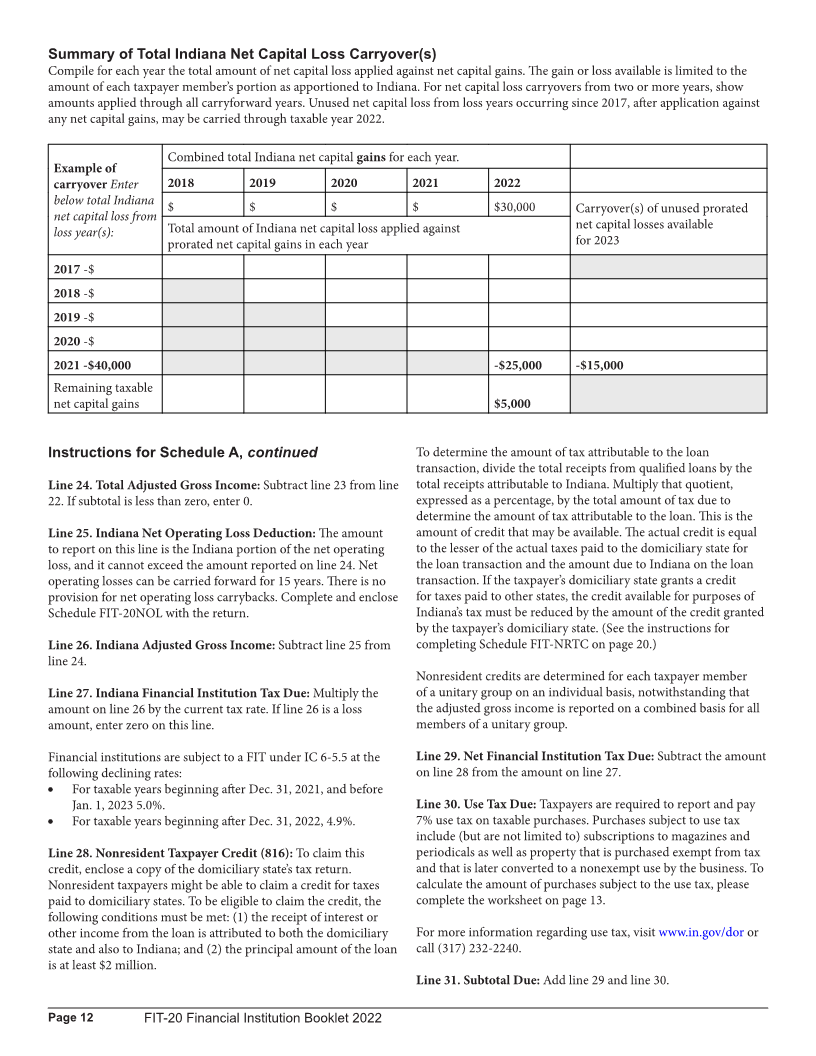 Enlarge image |
Summary of Total Indiana Net Capital Loss Carryover(s)
Compile for each year the total amount of net capital loss applied against net capital gains. The gain or loss available is limited to the
amount of each taxpayer member’s portion as apportioned to Indiana. For net capital loss carryovers from two or more years, show
amounts applied through all carryforward years. Unused net capital loss from loss years occurring since 2017, after application against
any net capital gains, may be carried through taxable year 2022.
Combined total Indiana net capital gains for each year.
Example of
carryover Enter 2018 2019 2020 2021 2022
below total Indiana $ $ $ $ $30,000 Carryover(s) of unused prorated
net capital loss from
net capital losses available
loss year(s): Total amount of Indiana net capital loss applied against
prorated net capital gains in each year for 2023
2017 -$
2018 -$
2019 -$
2020 -$
2021 -$40,000 -$25,000 -$15,000
Remaining taxable
net capital gains $5,000
Instructions for Schedule A, continued To determine the amount of tax attributable to the loan
transaction, divide the total receipts from qualified loans by the
Line 24. Total Adjusted Gross Income: Subtract line 23 from line total receipts attributable to Indiana. Multiply that quotient,
22. If subtotal is less than zero, enter 0. expressed as a percentage, by the total amount of tax due to
determine the amount of tax attributable to the loan. This is the
Line 25. Indiana Net Operating Loss Deduction: The amount amount of credit that may be available. The actual credit is equal
to report on this line is the Indiana portion of the net operating to the lesser of the actual taxes paid to the domiciliary state for
loss, and it cannot exceed the amount reported on line 24. Net the loan transaction and the amount due to Indiana on the loan
operating losses can be carried forward for 15 years. There is no transaction. If the taxpayer’s domiciliary state grants a credit
provision for net operating loss carrybacks. Complete and enclose for taxes paid to other states, the credit available for purposes of
Schedule FIT-20NOL with the return. Indiana’s tax must be reduced by the amount of the credit granted
by the taxpayer’s domiciliary state. (See the instructions for
Line 26. Indiana Adjusted Gross Income: Subtract line 25 from completing Schedule FIT-NRTC on page 20.)
line 24.
Nonresident credits are determined for each taxpayer member
Line 27. Indiana Financial Institution Tax Due: Multiply the of a unitary group on an individual basis, notwithstanding that
amount on line 26 by the current tax rate. If line 26 is a loss the adjusted gross income is reported on a combined basis for all
amount, enter zero on this line. members of a unitary group.
Financial institutions are subject to a FIT under IC 6-5.5 at the Line 29. Net Financial Institution Tax Due: Subtract the amount
following declining rates: on line 28 from the amount on line 27.
• For taxable years beginning after Dec. 31, 2021, and before
Jan. 1, 2023 5.0%. Line 30. Use Tax Due: Taxpayers are required to report and pay
• For taxable years beginning after Dec. 31, 2022, 4.9%. 7% use tax on taxable purchases. Purchases subject to use tax
include (but are not limited to) subscriptions to magazines and
Line 28. Nonresident Taxpayer Credit (816): To claim this periodicals as well as property that is purchased exempt from tax
credit, enclose a copy of the domiciliary state’s tax return. and that is later converted to a nonexempt use by the business. To
Nonresident taxpayers might be able to claim a credit for taxes calculate the amount of purchases subject to the use tax, please
paid to domiciliary states. To be eligible to claim the credit, the complete the worksheet on page 13.
following conditions must be met: (1) the receipt of interest or
other income from the loan is attributed to both the domiciliary For more information regarding use tax, visit www.in.gov/dor or
state and also to Indiana; and (2) the principal amount of the loan call (317) 232-2240.
is at least $2 million.
Line 31. Subtotal Due: Add line 29 and line 30.
Page 12 FIT-20 Financial Institution Booklet 2022
|
 Enlarge image |
Tax Liability Credits — Limited to One Per Project Line 32. Neighborhood Assistance Tax Credit 828
If you made a contribution or engaged in activities to upgrade
Restriction for Certain Tax Credits – Limited to One Per Project areas in Indiana, you may be able to claim a credit for this
Within a certain group of credits, a taxpayer may not be granted assistance. Contact the Indiana Housing & Community
more than one credit for the same project. You can choose the Development Authority, Neighborhood Assistance Program, 30 S.
credit to be applied. However, the credit selected cannot be Meridian, Suite 1000, Indianapolis, IN 46204, telephone number
changed nor can the investment be redirected for a different credit (317) 232-7777 (800- 872-0371 outside Indianapolis), for more
in subsequent years. See Income Tax Information Bulletin #59 at information. Pass-through entities are eligible for the credit.
www.in.gov/dor/files/reference/ib59.pdf for more information.
Line 33. Enterprise Zone Employment Expense Tax Credit 812
Six credits are included in this group: This credit is based on qualified investments made within an Indiana
1. Alternative fuel vehicle manufacturer credit; enterprise zone. It is the lesser of 10% of qualifying wages or $1,500
2. Community revitalization enhancement district credit; per qualified employee, up to the amount of tax liability on income
3. Enterprise zone investment cost credit (not applicable to FIT-20); derived from an enterprise zone. Enclose the completed Schedule
4. Hoosier business investment credit; EZ 1, 2, 3 with the return, otherwise the credit will be denied.
5. Industrial recovery credit; and
6. Venture capital investment credit. Find the Indiana Schedule EZ 1, 2, 3 at www.in.gov/dor/tax-
forms/enterprise-zone-forms for more information on how to
Order of Credit Application calculate this credit.
If claiming more than one credit, first use the credits that cannot
be carried over and applied against the state FIT in another year. Line 34. Enterprise Zone Loan Interest Tax Credit 814
Next, use the credits that can be carried over for a limited number This credit is allowed for up to 5% of the interest received from all
of years and applied against the state FIT. If one or more credits qualified loans made during a tax year for use in an active Indiana
are available, apply the credits in the order that the credits would enterprise zone.
expire. Finally, use the credits that can be carried over and applied
against the state FIT in another year. See Income Tax Information Bulletin #66 available at www.in.gov/
dor/tax-forms/enterprise-zone-forms for more information on
Example. A taxpayer has a neighborhood assistance credit for how to calculate this credit.
which no carryover is available, a school scholarship credit that
can be carried forward to 2023, and a community revitalization Note. Schedule LIC must be enclosed if claiming this credit; it is
enhancement district credit with an indefinite carryforward. The available at www.in.gov/dor/tax-forms/enterprise-zone-forms.
taxpayer would apply the credits in the following order until the Contact the Indiana Economic Development Corporation at 1
credit is exhausted or the taxpayer’s liability is reduced to zero, N. Capitol Ave., Suite 700, Indianapolis, IN 46204; call them at
whichever comes first: (317) 232-8800; or visit the IEDC website at www.iedc.in.gov for
• Neighborhood assistance credit additional information.
• School scholarship credit expiring in 2023
• Community revitalization enhancement district credit Enclose Schedule LIC with the return, otherwise the credit will be
denied.
For more information about Indiana tax credits, see Income
Tax Information Bulletin #59 available at www.in.gov/dor/files/
reference/ib59.pdf.
Sales/Use Tax Worksheet
List all purchases made during the tax year from out-of-state retailers.
Column A Column B Column C
Description of personal property purchased from out-of-state retailer Date of purchase(s) Purchase Price of
Property(s)
Magazine subscriptions:
Mail order purchases:
Internet purchases:
Other purchases:
1. Total purchase price of property subject to the sales/use tax: enter total of Columns C .............................. 1
2. Sales/use tax: Multiply line 1 by .07 (7%) ..................................................................................................... 2
3. Sales tax previously paid on the above items (up to 7% per item) ............................................................... 3
4. Total amount due: Subtract line 3 from line 2. Carry to Form FIT-20, line 30. If the amount is negative,
enter zero and put no entry on line 30 of the FIT-20 ..................................................................................... 4
FIT-20 Financial Institution Booklet 2022 Page 13
|
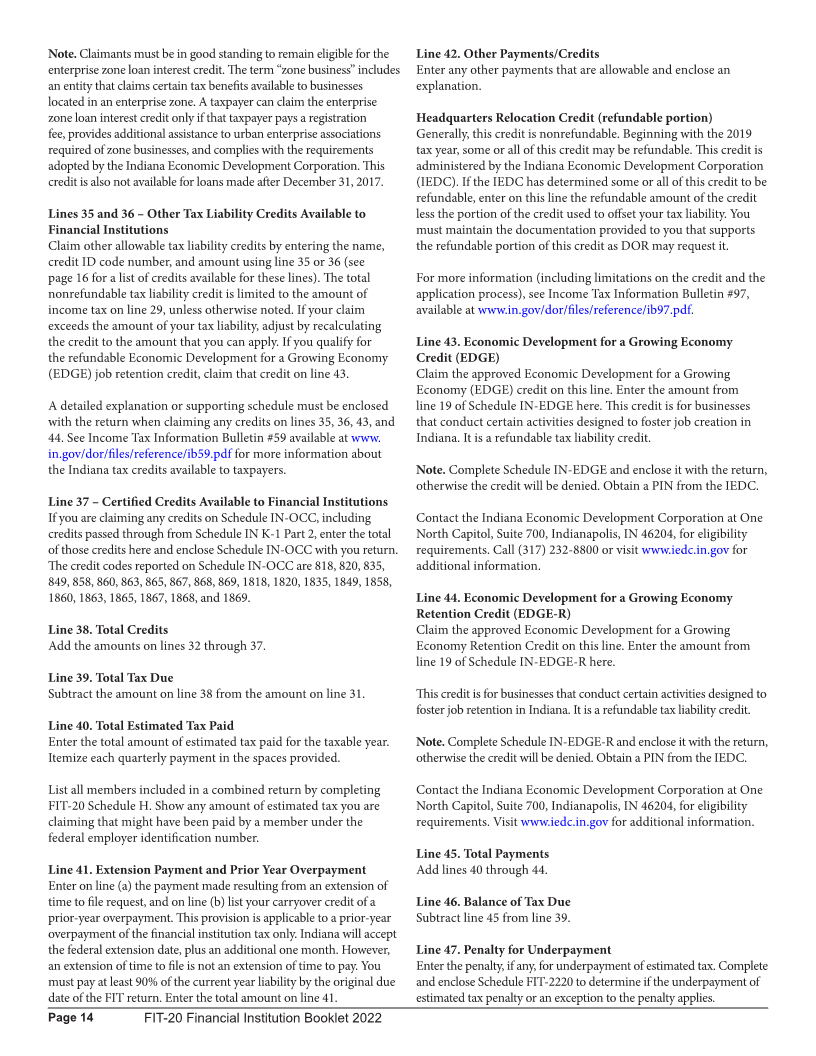 Enlarge image |
Note. Claimants must be in good standing to remain eligible for the Line 42. Other Payments/Credits
enterprise zone loan interest credit. The term “zone business” includes Enter any other payments that are allowable and enclose an
an entity that claims certain tax benefits available to businesses explanation.
located in an enterprise zone. A taxpayer can claim the enterprise
zone loan interest credit only if that taxpayer pays a registration Headquarters Relocation Credit (refundable portion)
fee, provides additional assistance to urban enterprise associations Generally, this credit is nonrefundable. Beginning with the 2019
required of zone businesses, and complies with the requirements tax year, some or all of this credit may be refundable. This credit is
adopted by the Indiana Economic Development Corporation. This administered by the Indiana Economic Development Corporation
credit is also not available for loans made after December 31, 2017. (IEDC). If the IEDC has determined some or all of this credit to be
refundable, enter on this line the refundable amount of the credit
Lines 35 and 36 – Other Tax Liability Credits Available to less the portion of the credit used to offset your tax liability. You
Financial Institutions must maintain the documentation provided to you that supports
Claim other allowable tax liability credits by entering the name, the refundable portion of this credit as DOR may request it.
credit ID code number, and amount using line 35 or 36 (see
page 16 for a list of credits available for these lines). The total For more information (including limitations on the credit and the
nonrefundable tax liability credit is limited to the amount of application process), see Income Tax Information Bulletin #97,
income tax on line 29, unless otherwise noted. If your claim available at www.in.gov/dor/files/reference/ib97.pdf.
exceeds the amount of your tax liability, adjust by recalculating
the credit to the amount that you can apply. If you qualify for Line 43. Economic Development for a Growing Economy
the refundable Economic Development for a Growing Economy Credit (EDGE)
(EDGE) job retention credit, claim that credit on line 43. Claim the approved Economic Development for a Growing
Economy (EDGE) credit on this line. Enter the amount from
A detailed explanation or supporting schedule must be enclosed line 19 of Schedule IN-EDGE here. This credit is for businesses
with the return when claiming any credits on lines 35, 36, 43, and that conduct certain activities designed to foster job creation in
44. See Income Tax Information Bulletin #59 available at www. Indiana. It is a refundable tax liability credit.
in.gov/dor/files/reference/ib59.pdf for more information about
the Indiana tax credits available to taxpayers. Note. Complete Schedule IN-EDGE and enclose it with the return,
otherwise the credit will be denied. Obtain a PIN from the IEDC.
Line 37 – Certified Credits Available to Financial Institutions
If you are claiming any credits on Schedule IN-OCC, including Contact the Indiana Economic Development Corporation at One
credits passed through from Schedule IN K-1 Part 2, enter the total North Capitol, Suite 700, Indianapolis, IN 46204, for eligibility
of those credits here and enclose Schedule IN-OCC with you return. requirements. Call (317) 232-8800 or visit www.iedc.in.gov for
The credit codes reported on Schedule IN-OCC are 818, 820, 835, additional information.
849, 858, 860, 863, 865, 867, 868, 869, 1818, 1820, 1835, 1849, 1858,
1860, 1863, 1865, 1867, 1868, and 1869. Line 44. Economic Development for a Growing Economy
Retention Credit (EDGE-R)
Line 38. Total Credits Claim the approved Economic Development for a Growing
Add the amounts on lines 32 through 37. Economy Retention Credit on this line. Enter the amount from
line 19 of Schedule IN-EDGE-R here.
Line 39. Total Tax Due
Subtract the amount on line 38 from the amount on line 31. This credit is for businesses that conduct certain activities designed to
foster job retention in Indiana. It is a refundable tax liability credit.
Line 40. Total Estimated Tax Paid
Enter the total amount of estimated tax paid for the taxable year. Note. Complete Schedule IN-EDGE-R and enclose it with the return,
Itemize each quarterly payment in the spaces provided. otherwise the credit will be denied. Obtain a PIN from the IEDC.
List all members included in a combined return by completing Contact the Indiana Economic Development Corporation at One
FIT-20 Schedule H. Show any amount of estimated tax you are North Capitol, Suite 700, Indianapolis, IN 46204, for eligibility
claiming that might have been paid by a member under the requirements. Visit www.iedc.in.gov for additional information.
federal employer identification number.
Line 45. Total Payments
Line 41. Extension Payment and Prior Year Overpayment Add lines 40 through 44.
Enter on line (a) the payment made resulting from an extension of
time to file request, and on line (b) list your carryover credit of a Line 46. Balance of Tax Due
prior-year overpayment. This provision is applicable to a prior-year Subtract line 45 from line 39.
overpayment of the financial institution tax only. Indiana will accept
the federal extension date, plus an additional one month. However, Line 47. Penalty for Underpayment
an extension of time to file is not an extension of time to pay. You Enter the penalty, if any, for underpayment of estimated tax. Complete
must pay at least 90% of the current year liability by the original due and enclose Schedule FIT-2220 to determine if the underpayment of
date of the FIT return. Enter the total amount on line 41. estimated tax penalty or an exception to the penalty applies.
Page 14 FIT-20 Financial Institution Booklet 2022
|
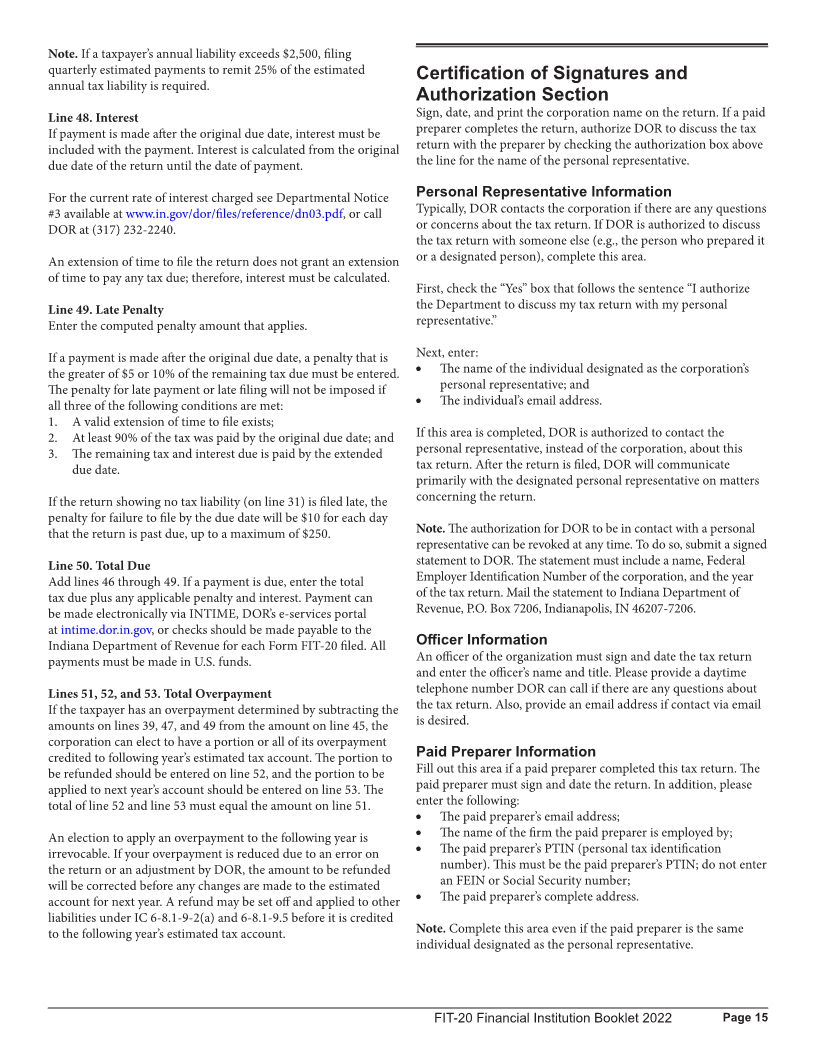 Enlarge image |
Note. If a taxpayer’s annual liability exceeds $2,500, filing
quarterly estimated payments to remit 25% of the estimated
Certification of Signatures and
annual tax liability is required.
Authorization Section
Line 48. Interest Sign, date, and print the corporation name on the return. If a paid
If payment is made after the original due date, interest must be preparer completes the return, authorize DOR to discuss the tax
included with the payment. Interest is calculated from the original return with the preparer by checking the authorization box above
due date of the return until the date of payment. the line for the name of the personal representative.
For the current rate of interest charged see Departmental Notice Personal Representative Information
#3 available at www.in.gov/dor/files/reference/dn03.pdf, or call Typically, DOR contacts the corporation if there are any questions
DOR at (317) 232-2240. or concerns about the tax return. If DOR is authorized to discuss
the tax return with someone else (e.g., the person who prepared it
An extension of time to file the return does not grant an extension or a designated person), complete this area.
of time to pay any tax due; therefore, interest must be calculated.
First, check the “Yes” box that follows the sentence “I authorize
Line 49. Late Penalty the Department to discuss my tax return with my personal
Enter the computed penalty amount that applies. representative.”
If a payment is made after the original due date, a penalty that is Next, enter:
the greater of $5 or 10% of the remaining tax due must be entered. • The name of the individual designated as the corporation’s
The penalty for late payment or late filing will not be imposed if personal representative; and
all three of the following conditions are met: • The individual’s email address.
1. A valid extension of time to file exists;
2. At least 90% of the tax was paid by the original due date; and If this area is completed, DOR is authorized to contact the
3. The remaining tax and interest due is paid by the extended personal representative, instead of the corporation, about this
due date. tax return. After the return is filed, DOR will communicate
primarily with the designated personal representative on matters
If the return showing no tax liability (on line 31) is filed late, the concerning the return.
penalty for failure to file by the due date will be $10 for each day
that the return is past due, up to a maximum of $250. Note. The authorization for DOR to be in contact with a personal
representative can be revoked at any time. To do so, submit a signed
Line 50. Total Due statement to DOR. The statement must include a name, Federal
Add lines 46 through 49. If a payment is due, enter the total Employer Identification Number of the corporation, and the year
tax due plus any applicable penalty and interest. Payment can of the tax return. Mail the statement to Indiana Department of
be made electronically via INTIME, DOR’s e-services portal Revenue, P.O. Box 7206, Indianapolis, IN 46207-7206.
at intime.dor.in.gov, or checks should be made payable to the
Indiana Department of Revenue for each Form FIT-20 filed. All Officer Information
payments must be made in U.S. funds. An officer of the organization must sign and date the tax return
and enter the officer’s name and title. Please provide a daytime
Lines 51, 52, and 53. Total Overpayment telephone number DOR can call if there are any questions about
If the taxpayer has an overpayment determined by subtracting the the tax return. Also, provide an email address if contact via email
amounts on lines 39, 47, and 49 from the amount on line 45, the is desired.
corporation can elect to have a portion or all of its overpayment
credited to following year’s estimated tax account. The portion to Paid Preparer Information
be refunded should be entered on line 52, and the portion to be Fill out this area if a paid preparer completed this tax return. The
applied to next year’s account should be entered on line 53. The paid preparer must sign and date the return. In addition, please
total of line 52 and line 53 must equal the amount on line 51. enter the following:
• The paid preparer’s email address;
An election to apply an overpayment to the following year is • The name of the firm the paid preparer is employed by;
irrevocable. If your overpayment is reduced due to an error on • The paid preparer’s PTIN (personal tax identification
the return or an adjustment by DOR, the amount to be refunded number). This must be the paid preparer’s PTIN; do not enter
will be corrected before any changes are made to the estimated an FEIN or Social Security number;
account for next year. A refund may be set off and applied to other • The paid preparer’s complete address.
liabilities under IC 6-8.1-9-2(a) and 6-8.1-9.5 before it is credited
to the following year’s estimated tax account. Note. Complete this area even if the paid preparer is the same
individual designated as the personal representative.
FIT-20 Financial Institution Booklet 2022 Page 15
|
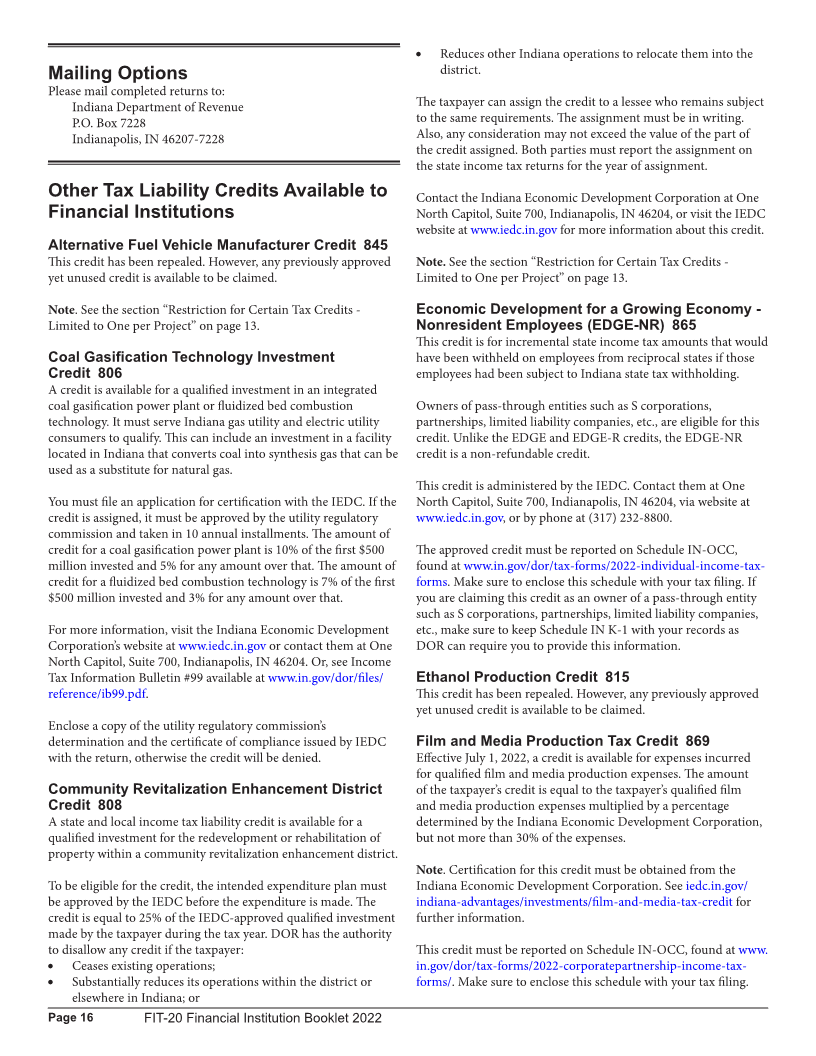 Enlarge image |
• Reduces other Indiana operations to relocate them into the
district.
Mailing Options
Please mail completed returns to:
Indiana Department of Revenue The taxpayer can assign the credit to a lessee who remains subject
P.O. Box 7228 to the same requirements. The assignment must be in writing.
Indianapolis, IN 46207-7228 Also, any consideration may not exceed the value of the part of
the credit assigned. Both parties must report the assignment on
the state income tax returns for the year of assignment.
Other Tax Liability Credits Available to Contact the Indiana Economic Development Corporation at One
Financial Institutions North Capitol, Suite 700, Indianapolis, IN 46204, or visit the IEDC
website at www.iedc.in.gov for more information about this credit.
Alternative Fuel Vehicle Manufacturer Credit 845
This credit has been repealed. However, any previously approved Note. See the section “Restriction for Certain Tax Credits -
yet unused credit is available to be claimed. Limited to One per Project” on page 13.
Note. See the section “Restriction for Certain Tax Credits - Economic Development for a Growing Economy -
Limited to One per Project” on page 13. Nonresident Employees (EDGE-NR) 865
This credit is for incremental state income tax amounts that would
Coal Gasification Technology Investment have been withheld on employees from reciprocal states if those
Credit 806 employees had been subject to Indiana state tax withholding.
A credit is available for a qualified investment in an integrated
coal gasification power plant or fluidized bed combustion Owners of pass-through entities such as S corporations,
technology. It must serve Indiana gas utility and electric utility partnerships, limited liability companies, etc., are eligible for this
consumers to qualify. This can include an investment in a facility credit. Unlike the EDGE and EDGE-R credits, the EDGE-NR
located in Indiana that converts coal into synthesis gas that can be credit is a non-refundable credit.
used as a substitute for natural gas.
This credit is administered by the IEDC. Contact them at One
You must file an application for certification with the IEDC. If the North Capitol, Suite 700, Indianapolis, IN 46204, via website at
credit is assigned, it must be approved by the utility regulatory www.iedc.in.gov, or by phone at (317) 232-8800.
commission and taken in 10 annual installments. The amount of
credit for a coal gasification power plant is 10% of the first $500 The approved credit must be reported on Schedule IN-OCC,
million invested and 5% for any amount over that. The amount of found at www.in.gov/dor/tax-forms/2022-individual-income-tax-
credit for a fluidized bed combustion technology is 7% of the first forms. Make sure to enclose this schedule with your tax filing. If
$500 million invested and 3% for any amount over that. you are claiming this credit as an owner of a pass-through entity
such as S corporations, partnerships, limited liability companies,
For more information, visit the Indiana Economic Development etc., make sure to keep Schedule IN K-1 with your records as
Corporation’s website at www.iedc.in.gov or contact them at One DOR can require you to provide this information.
North Capitol, Suite 700, Indianapolis, IN 46204. Or, see Income
Tax Information Bulletin #99 available at www.in.gov/dor/files/ Ethanol Production Credit 815
reference/ib99.pdf. This credit has been repealed. However, any previously approved
yet unused credit is available to be claimed.
Enclose a copy of the utility regulatory commission’s
determination and the certificate of compliance issued by IEDC Film and Media Production Tax Credit 869
with the return, otherwise the credit will be denied. Effective July 1, 2022, a credit is available for expenses incurred
for qualified film and media production expenses. The amount
Community Revitalization Enhancement District of the taxpayer’s credit is equal to the taxpayer’s qualified film
Credit 808 and media production expenses multiplied by a percentage
A state and local income tax liability credit is available for a determined by the Indiana Economic Development Corporation,
qualified investment for the redevelopment or rehabilitation of but not more than 30% of the expenses.
property within a community revitalization enhancement district.
Note. Certification for this credit must be obtained from the
To be eligible for the credit, the intended expenditure plan must Indiana Economic Development Corporation. See iedc.in.gov/
be approved by the IEDC before the expenditure is made. The indiana-advantages/investments/film-and-media-tax-credit for
credit is equal to 25% of the IEDC-approved qualified investment further information.
made by the taxpayer during the tax year. DOR has the authority
to disallow any credit if the taxpayer: This credit must be reported on Schedule IN-OCC, found at www.
• Ceases existing operations; in.gov/dor/tax-forms/2022-corporatepartnership-income-tax-
• Substantially reduces its operations within the district or forms/. Make sure to enclose this schedule with your tax filing.
elsewhere in Indiana; or
Page 16 FIT-20 Financial Institution Booklet 2022
|
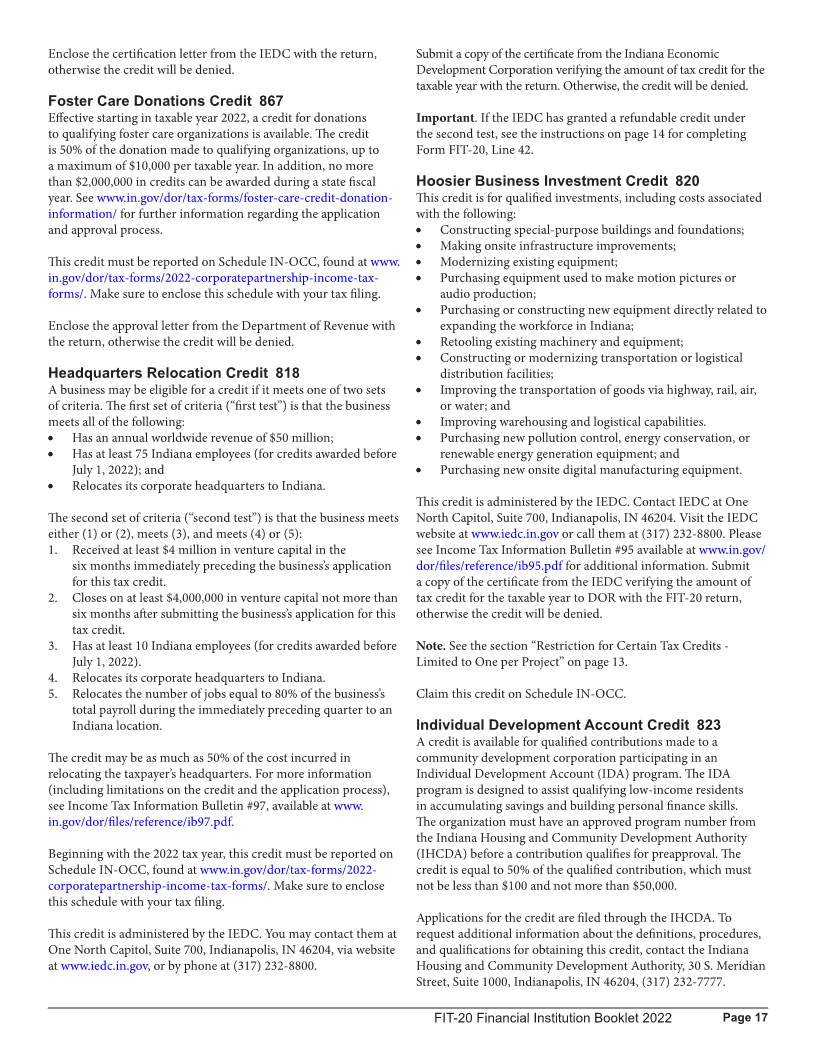 Enlarge image |
Enclose the certification letter from the IEDC with the return, Submit a copy of the certificate from the Indiana Economic
otherwise the credit will be denied. Development Corporation verifying the amount of tax credit for the
taxable year with the return. Otherwise, the credit will be denied.
Foster Care Donations Credit 867
Effective starting in taxable year 2022, a credit for donations Important. If the IEDC has granted a refundable credit under
to qualifying foster care organizations is available. The credit the second test, see the instructions on page 14 for completing
is 50% of the donation made to qualifying organizations, up to Form FIT-20, Line 42.
a maximum of $10,000 per taxable year. In addition, no more
than $2,000,000 in credits can be awarded during a state fiscal Hoosier Business Investment Credit 820
year. See www.in.gov/dor/tax-forms/foster-care-credit-donation- This credit is for qualified investments, including costs associated
information/ for further information regarding the application with the following:
and approval process. • Constructing special-purpose buildings and foundations;
• Making onsite infrastructure improvements;
This credit must be reported on Schedule IN-OCC, found at www. • Modernizing existing equipment;
in.gov/dor/tax-forms/2022-corporatepartnership-income-tax- • Purchasing equipment used to make motion pictures or
forms/. Make sure to enclose this schedule with your tax filing. audio production;
• Purchasing or constructing new equipment directly related to
Enclose the approval letter from the Department of Revenue with expanding the workforce in Indiana;
the return, otherwise the credit will be denied. • Retooling existing machinery and equipment;
• Constructing or modernizing transportation or logistical
Headquarters Relocation Credit 818 distribution facilities;
A business may be eligible for a credit if it meets one of two sets • Improving the transportation of goods via highway, rail, air,
of criteria. The first set of criteria (“first test”) is that the business or water; and
meets all of the following: • Improving warehousing and logistical capabilities.
• Has an annual worldwide revenue of $50 million; • Purchasing new pollution control, energy conservation, or
• Has at least 75 Indiana employees (for credits awarded before renewable energy generation equipment; and
July 1, 2022); and • Purchasing new onsite digital manufacturing equipment.
• Relocates its corporate headquarters to Indiana.
This credit is administered by the IEDC. Contact IEDC at One
The second set of criteria (“second test”) is that the business meets North Capitol, Suite 700, Indianapolis, IN 46204. Visit the IEDC
either (1) or (2), meets (3), and meets (4) or (5): website at www.iedc.in.gov or call them at (317) 232-8800. Please
1. Received at least $4 million in venture capital in the see Income Tax Information Bulletin #95 available at www.in.gov/
six months immediately preceding the business’s application dor/files/reference/ib95.pdf for additional information. Submit
for this tax credit. a copy of the certificate from the IEDC verifying the amount of
2. Closes on at least $4,000,000 in venture capital not more than tax credit for the taxable year to DOR with the FIT-20 return,
six months after submitting the business’s application for this otherwise the credit will be denied.
tax credit.
3. Has at least 10 Indiana employees (for credits awarded before Note. See the section “Restriction for Certain Tax Credits -
July 1, 2022). Limited to One per Project” on page 13.
4. Relocates its corporate headquarters to Indiana.
5. Relocates the number of jobs equal to 80% of the business’s Claim this credit on Schedule IN-OCC.
total payroll during the immediately preceding quarter to an
Indiana location. Individual Development Account Credit 823
A credit is available for qualified contributions made to a
The credit may be as much as 50% of the cost incurred in community development corporation participating in an
relocating the taxpayer’s headquarters. For more information Individual Development Account (IDA) program. The IDA
(including limitations on the credit and the application process), program is designed to assist qualifying low-income residents
see Income Tax Information Bulletin #97, available at www. in accumulating savings and building personal finance skills.
in.gov/dor/files/reference/ib97.pdf. The organization must have an approved program number from
the Indiana Housing and Community Development Authority
Beginning with the 2022 tax year, this credit must be reported on (IHCDA) before a contribution qualifies for preapproval. The
Schedule IN-OCC, found at www.in.gov/dor/tax-forms/2022- credit is equal to 50% of the qualified contribution, which must
corporatepartnership-income-tax-forms/. Make sure to enclose not be less than $100 and not more than $50,000.
this schedule with your tax filing.
Applications for the credit are filed through the IHCDA. To
This credit is administered by the IEDC. You may contact them at request additional information about the definitions, procedures,
One North Capitol, Suite 700, Indianapolis, IN 46204, via website and qualifications for obtaining this credit, contact the Indiana
at www.iedc.in.gov, or by phone at (317) 232-8800. Housing and Community Development Authority, 30 S. Meridian
Street, Suite 1000, Indianapolis, IN 46204, (317) 232-7777.
FIT-20 Financial Institution Booklet 2022 Page 17
|
 Enlarge image |
Keep any approval certification or letter of credit assignment with IN, 46204. Visit the IEDC website at www.iedc.in.gov or call (317)
your records as DOR can require you to provide this information 232-8800 for additional information.
at a later date.
The approved credit must be reported on Schedule IN-OCC, found
Industrial Recovery Credit 824 at www.in.gov/dor/tax-forms/2022-corporatepartnership-income-
This credit is based on a taxpayer’s qualified investment in a vacant tax-forms/. Make sure to enclose this schedule with your tax filing.
industrial facility located in a designated industrial recovery site.
If the Indiana Economic Development Corporation approves the Riverboat Building Credit 832
application and the plan for rehabilitation, you are entitled to a This credit has been repealed. However, any previously approved
credit based on the “qualified investment.” The minimum age for a yet unused credit is available to be claimed. Enclose certification
facility to be eligible for this credit has been reduced from 20 years from the IEDC, the credit assignment, and proof of investment
to 15 years. This credit is available to pass-through entities such as with the return. Otherwise, the credit will be denied.
S corporations, partnerships, limited liability companies, etc.
School Scholarship Credit 849
Note. Except for in situations described in the next sentence, A credit is available for contributions to school scholarship
a taxpayer is entitled to receive this credit only for a qualified programs. A taxpayer that makes a qualifying contribution to a
investment made before January 1, 2020. A taxpayer is entitled to scholarship granting organization (SGO) is entitled to a credit
receive a credit for a qualified investment made after December against the state tax liability in the taxable year in which the
31, 2019, and before January 1, 2030, if the taxpayer is awarded a contribution is made. The amount of a taxpayer’s credit is equal
credit under: to 50% of the amount of the contribution made to the SGO for a
• an application approved by the Indiana Economic school scholarship program. In some cases, the department may
Development Corporation (IEDC) before January 1, 2020; or round the credit down to the nearest dollar if the department
• an agreement entered into by the taxpayer and IEDC before receives information that the credit should be the amount as
January 1, 2021. rounded down. Effective Jan. 1, 2013, this credit can now be
carried forward for nine years after the unused credit year.
Important. Any unused credit existing before Jan. 01, 2020, is still
eligible for carryforward for an unlimited number of years. Note. Credits that apply to taxable years beginning before Jan. 1,
2013, may not be carried forward.
For additional information regarding procedures for obtaining
this credit, contact: To qualify for the credit, the taxpayer must:
Indiana Economic Development Corporation • Make a contribution to a scholarship granting organization that
One North Capitol, Suite 700 is certified by the Department of Education under IC 20-51;
Indianapolis, IN 46204 • Make the contribution directly to the SGO;
Call (317) 232-8800, or visit their website at www.iedc.in.gov. • Designate in writing to the SGO that the contribution is to be
used solely for a school scholarship program or have written
Military Base Investment Cost Credit 826 confirmation from the SGO that the contribution will be used
This credit has been repealed. However, any previously approved solely for a program.
yet unused credit is available to be claimed.
Although there are no limits on the size of a qualifying contribution
Military Base Recovery Credit 827 to an SGO, the entire tax credit program has a limit of $18.5 million
This credit has been repealed. However, any previously approved in credits per state fiscal year of July 1, 2022 through June 30, 2023.
yet unused credit is available to be claimed.
Enclose Schedule IN-OCC with the return to claim this credit,
Natural Gas Commercial Vehicle Credit 858 otherwise the credit will be denied.
This credit has sunset. However, any previously approved yet
unused credit is available to be claimed. Venture Capital Investment Credit 835
A taxpayer who provides qualified investment capital to a
The carryforward portion of the previously approved credit being qualified Indiana business may be eligible for this credit. Per IC
claimed must be reported on Schedule IN-OCC, found at www. 6-3.1-24-8, for calendar years beginning after Dec. 31, 2010, the
in.gov/dor/tax-forms/2022-corporatepartnership-income-tax- maximum credit available to a qualified business is $1 million.
forms/. Make sure to enclose this schedule with your tax filing.
Note. Certification for this credit must be obtained from the
Redevelopment Tax Credit 863 Indiana Economic Development Corporation, Development
You may be eligible for a credit if you make a qualified investment Finance Office, VCI Credit Program, One North Capitol, Suite
for the redevelopment or rehabilitation of real property located 700, Indianapolis, IN 46204.
within a qualified redevelopment site.
Beginning with the 2020 tax year, this credit must be reported on
This credit is administered by the Indiana Economic Development Schedule IN-OCC, found at www.in.gov/dor/tax-forms/2022-
Corporation (IEDC), One North Capitol, Suite 700, Indianapolis, corporatepartnership-income-tax-forms/. Make sure to enclose
this schedule with your tax filing.
Page 18 FIT-20 Financial Institution Booklet 2022
|
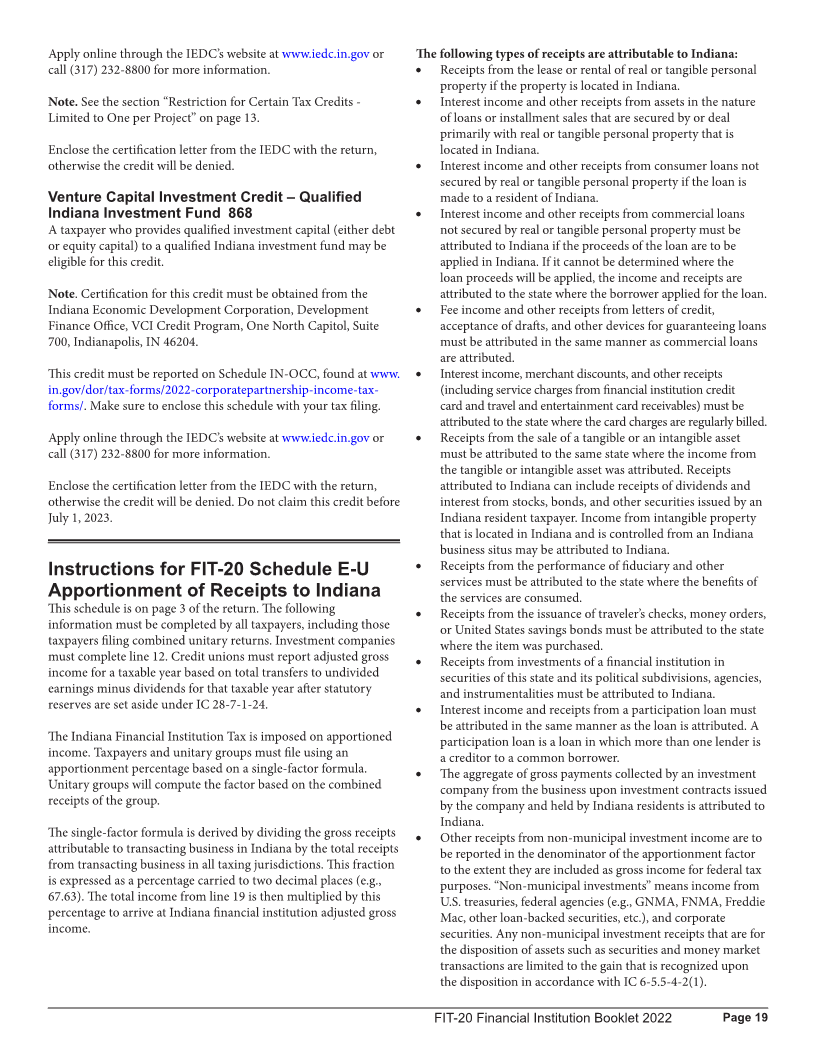 Enlarge image |
Apply online through the IEDC’s website at www.iedc.in.gov or The following types of receipts are attributable to Indiana:
call (317) 232-8800 for more information. • Receipts from the lease or rental of real or tangible personal
property if the property is located in Indiana.
Note. See the section “Restriction for Certain Tax Credits - • Interest income and other receipts from assets in the nature
Limited to One per Project” on page 13. of loans or installment sales that are secured by or deal
primarily with real or tangible personal property that is
Enclose the certification letter from the IEDC with the return, located in Indiana.
otherwise the credit will be denied. • Interest income and other receipts from consumer loans not
secured by real or tangible personal property if the loan is
Venture Capital Investment Credit – Qualified made to a resident of Indiana.
Indiana Investment Fund 868 • Interest income and other receipts from commercial loans
A taxpayer who provides qualified investment capital (either debt not secured by real or tangible personal property must be
or equity capital) to a qualified Indiana investment fund may be attributed to Indiana if the proceeds of the loan are to be
eligible for this credit. applied in Indiana. If it cannot be determined where the
loan proceeds will be applied, the income and receipts are
Note. Certification for this credit must be obtained from the attributed to the state where the borrower applied for the loan.
Indiana Economic Development Corporation, Development • Fee income and other receipts from letters of credit,
Finance Office, VCI Credit Program, One North Capitol, Suite acceptance of drafts, and other devices for guaranteeing loans
700, Indianapolis, IN 46204. must be attributed in the same manner as commercial loans
are attributed.
This credit must be reported on Schedule IN-OCC, found at www. • Interest income, merchant discounts, and other receipts
in.gov/dor/tax-forms/2022-corporatepartnership-income-tax- (including service charges from financial institution credit
forms/. Make sure to enclose this schedule with your tax filing. card and travel and entertainment card receivables) must be
attributed to the state where the card charges are regularly billed.
Apply online through the IEDC’s website at www.iedc.in.gov or • Receipts from the sale of a tangible or an intangible asset
call (317) 232-8800 for more information. must be attributed to the same state where the income from
the tangible or intangible asset was attributed. Receipts
Enclose the certification letter from the IEDC with the return, attributed to Indiana can include receipts of dividends and
otherwise the credit will be denied. Do not claim this credit before interest from stocks, bonds, and other securities issued by an
July 1, 2023. Indiana resident taxpayer. Income from intangible property
that is located in Indiana and is controlled from an Indiana
business situs may be attributed to Indiana.
• Receipts from the performance of fiduciary and other
Instructions for FIT-20 Schedule E-U
services must be attributed to the state where the benefits of
Apportionment of Receipts to Indiana the services are consumed.
This schedule is on page 3 of the return. The following • Receipts from the issuance of traveler’s checks, money orders,
information must be completed by all taxpayers, including those or United States savings bonds must be attributed to the state
taxpayers filing combined unitary returns. Investment companies where the item was purchased.
must complete line 12. Credit unions must report adjusted gross • Receipts from investments of a financial institution in
income for a taxable year based on total transfers to undivided securities of this state and its political subdivisions, agencies,
earnings minus dividends for that taxable year after statutory and instrumentalities must be attributed to Indiana.
reserves are set aside under IC 28-7-1-24. • Interest income and receipts from a participation loan must
be attributed in the same manner as the loan is attributed. A
The Indiana Financial Institution Tax is imposed on apportioned participation loan is a loan in which more than one lender is
income. Taxpayers and unitary groups must file using an a creditor to a common borrower.
apportionment percentage based on a single-factor formula. • The aggregate of gross payments collected by an investment
Unitary groups will compute the factor based on the combined company from the business upon investment contracts issued
receipts of the group. by the company and held by Indiana residents is attributed to
Indiana.
The single-factor formula is derived by dividing the gross receipts • Other receipts from non-municipal investment income are to
attributable to transacting business in Indiana by the total receipts be reported in the denominator of the apportionment factor
from transacting business in all taxing jurisdictions. This fraction to the extent they are included as gross income for federal tax
is expressed as a percentage carried to two decimal places (e.g., purposes. “Non-municipal investments” means income from
67.63). The total income from line 19 is then multiplied by this U.S. treasuries, federal agencies (e.g., GNMA, FNMA, Freddie
percentage to arrive at Indiana financial institution adjusted gross Mac, other loan-backed securities, etc.), and corporate
income. securities. Any non-municipal investment receipts that are for
the disposition of assets such as securities and money market
transactions are limited to the gain that is recognized upon
the disposition in accordance with IC 6-5.5-4-2(1).
FIT-20 Financial Institution Booklet 2022 Page 19
|
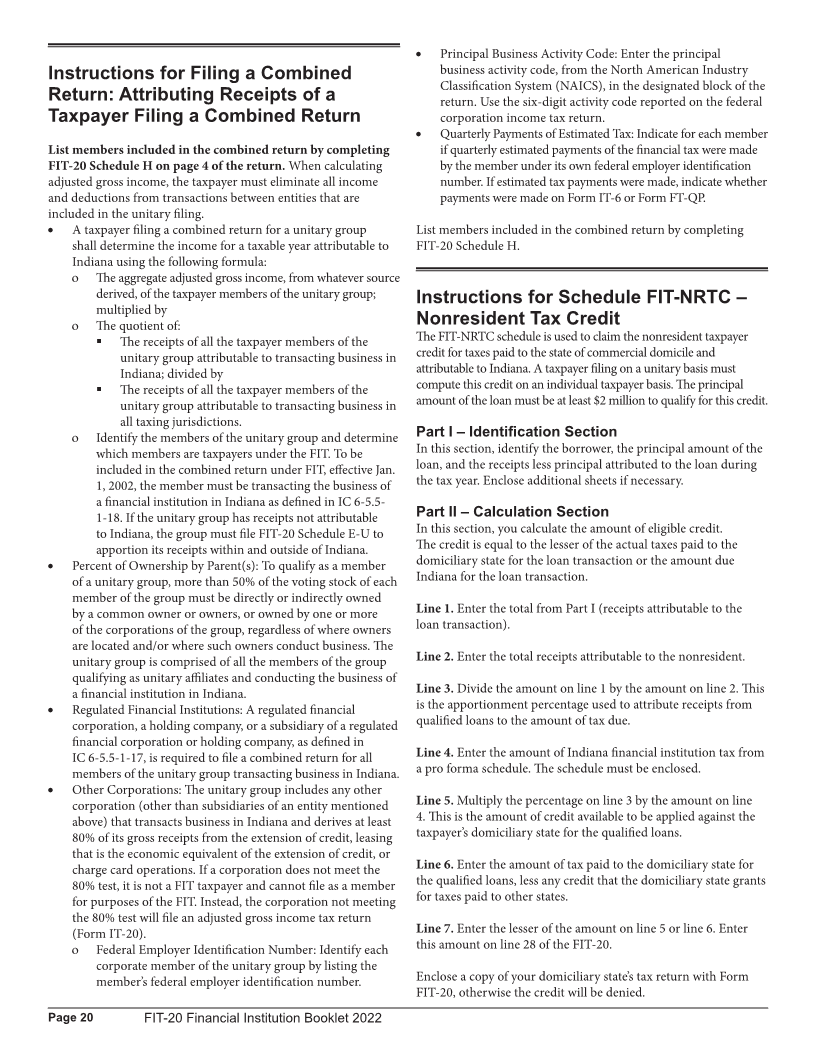 Enlarge image |
• Principal Business Activity Code: Enter the principal
business activity code, from the North American Industry
Instructions for Filing a Combined
Classification System (NAICS), in the designated block of the
Return: Attributing Receipts of a return. Use the six-digit activity code reported on the federal
Taxpayer Filing a Combined Return corporation income tax return.
• Quarterly Payments of Estimated Tax: Indicate for each member
List members included in the combined return by completing if quarterly estimated payments of the financial tax were made
FIT-20 Schedule H on page 4 of the return. When calculating by the member under its own federal employer identification
adjusted gross income, the taxpayer must eliminate all income number. If estimated tax payments were made, indicate whether
and deductions from transactions between entities that are payments were made on Form IT-6 or Form FT-QP.
included in the unitary filing.
• A taxpayer filing a combined return for a unitary group List members included in the combined return by completing
shall determine the income for a taxable year attributable to FIT-20 Schedule H.
Indiana using the following formula:
ο The aggregate adjusted gross income, from whatever source
derived, of the taxpayer members of the unitary group;
Instructions for Schedule FIT-NRTC –
multiplied by
ο The quotient of: Nonresident Tax Credit
The receipts of all the taxpayer members of the The FIT-NRTC schedule is used to claim the nonresident taxpayer
unitary group attributable to transacting business in credit for taxes paid to the state of commercial domicile and
Indiana; divided by attributable to Indiana. A taxpayer filing on a unitary basis must
The receipts of all the taxpayer members of the compute this credit on an individual taxpayer basis. The principal
unitary group attributable to transacting business in amount of the loan must be at least $2 million to qualify for this credit.
all taxing jurisdictions.
ο Identify the members of the unitary group and determine Part I – Identification Section
which members are taxpayers under the FIT. To be In this section, identify the borrower, the principal amount of the
included in the combined return under FIT, effective Jan. loan, and the receipts less principal attributed to the loan during
1, 2002, the member must be transacting the business of the tax year. Enclose additional sheets if necessary.
a financial institution in Indiana as defined in IC 6-5.5-
1-18. If the unitary group has receipts not attributable Part II – Calculation Section
to Indiana, the group must file FIT-20 Schedule E-U to In this section, you calculate the amount of eligible credit.
apportion its receipts within and outside of Indiana. The credit is equal to the lesser of the actual taxes paid to the
• Percent of Ownership by Parent(s): To qualify as a member domiciliary state for the loan transaction or the amount due
of a unitary group, more than 50% of the voting stock of each Indiana for the loan transaction.
member of the group must be directly or indirectly owned
by a common owner or owners, or owned by one or more Line 1. Enter the total from Part I (receipts attributable to the
of the corporations of the group, regardless of where owners loan transaction).
are located and/or where such owners conduct business. The
unitary group is comprised of all the members of the group Line 2. Enter the total receipts attributable to the nonresident.
qualifying as unitary affiliates and conducting the business of
a financial institution in Indiana. Line 3. Divide the amount on line 1 by the amount on line 2. This
• Regulated Financial Institutions: A regulated financial is the apportionment percentage used to attribute receipts from
corporation, a holding company, or a subsidiary of a regulated qualified loans to the amount of tax due.
financial corporation or holding company, as defined in
IC 6-5.5-1-17, is required to file a combined return for all Line 4. Enter the amount of Indiana financial institution tax from
members of the unitary group transacting business in Indiana. a pro forma schedule. The schedule must be enclosed.
• Other Corporations: The unitary group includes any other
corporation (other than subsidiaries of an entity mentioned Line 5. Multiply the percentage on line 3 by the amount on line
above) that transacts business in Indiana and derives at least 4. This is the amount of credit available to be applied against the
80% of its gross receipts from the extension of credit, leasing taxpayer’s domiciliary state for the qualified loans.
that is the economic equivalent of the extension of credit, or
charge card operations. If a corporation does not meet the Line 6. Enter the amount of tax paid to the domiciliary state for
80% test, it is not a FIT taxpayer and cannot file as a member the qualified loans, less any credit that the domiciliary state grants
for purposes of the FIT. Instead, the corporation not meeting for taxes paid to other states.
the 80% test will file an adjusted gross income tax return
(Form IT-20). Line 7. Enter the lesser of the amount on line 5 or line 6. Enter
ο Federal Employer Identification Number: Identify each this amount on line 28 of the FIT-20.
corporate member of the unitary group by listing the
member’s federal employer identification number. Enclose a copy of your domiciliary state’s tax return with Form
FIT-20, otherwise the credit will be denied.
Page 20 FIT-20 Financial Institution Booklet 2022
|
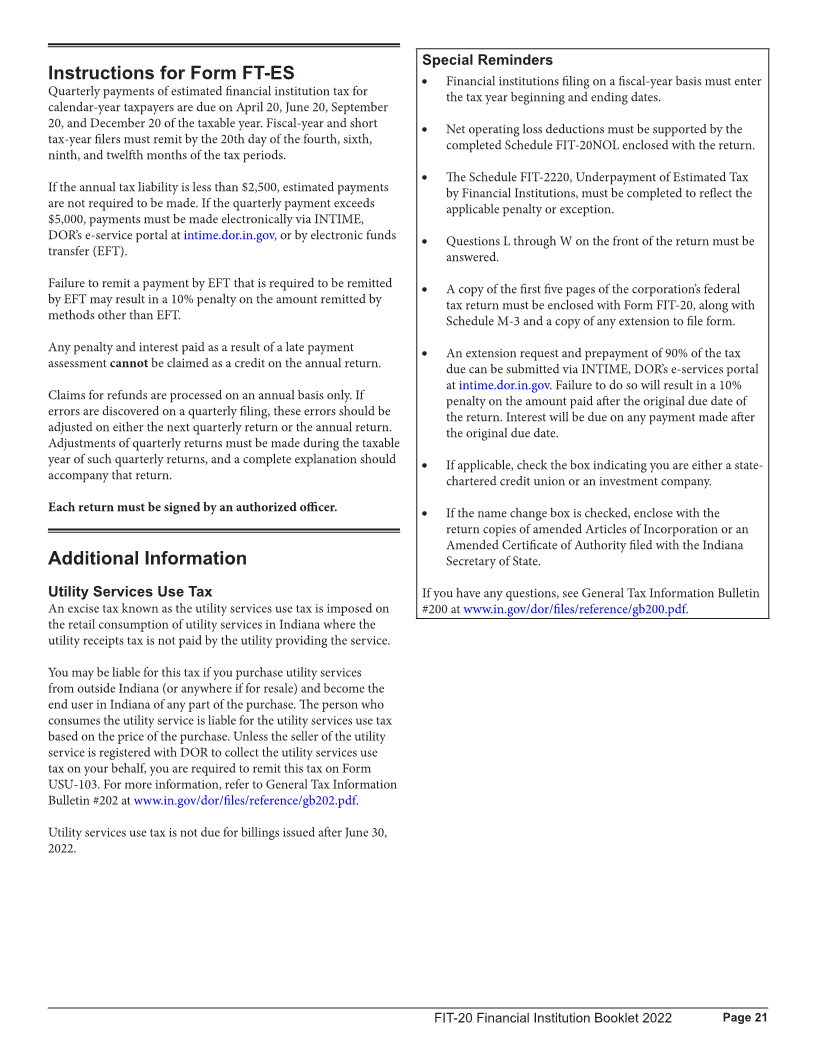 Enlarge image |
Special Reminders
Instructions for Form FT-ES • Financial institutions filing on a fiscal-year basis must enter
Quarterly payments of estimated financial institution tax for the tax year beginning and ending dates.
calendar-year taxpayers are due on April 20, June 20, September
20, and December 20 of the taxable year. Fiscal-year and short • Net operating loss deductions must be supported by the
tax-year filers must remit by the 20th day of the fourth, sixth, completed Schedule FIT-20NOL enclosed with the return.
ninth, and twelfth months of the tax periods.
• The Schedule FIT-2220, Underpayment of Estimated Tax
If the annual tax liability is less than $2,500, estimated payments by Financial Institutions, must be completed to reflect the
are not required to be made. If the quarterly payment exceeds applicable penalty or exception.
$5,000, payments must be made electronically via INTIME,
DOR’s e-service portal at intime.dor.in.gov, or by electronic funds • Questions L through W on the front of the return must be
transfer (EFT). answered.
Failure to remit a payment by EFT that is required to be remitted • A copy of the first five pages of the corporation’s federal
by EFT may result in a 10% penalty on the amount remitted by tax return must be enclosed with Form FIT-20, along with
methods other than EFT. Schedule M-3 and a copy of any extension to file form.
Any penalty and interest paid as a result of a late payment • An extension request and prepayment of 90% of the tax
assessment cannot be claimed as a credit on the annual return. due can be submitted via INTIME, DOR’s e-services portal
at intime.dor.in.gov. Failure to do so will result in a 10%
Claims for refunds are processed on an annual basis only. If penalty on the amount paid after the original due date of
errors are discovered on a quarterly filing, these errors should be the return. Interest will be due on any payment made after
adjusted on either the next quarterly return or the annual return. the original due date.
Adjustments of quarterly returns must be made during the taxable
year of such quarterly returns, and a complete explanation should • If applicable, check the box indicating you are either a state-
accompany that return. chartered credit union or an investment company.
Each return must be signed by an authorized officer. • If the name change box is checked, enclose with the
return copies of amended Articles of Incorporation or an
Amended Certificate of Authority filed with the Indiana
Additional Information Secretary of State.
Utility Services Use Tax If you have any questions, see General Tax Information Bulletin
An excise tax known as the utility services use tax is imposed on #200 at www.in.gov/dor/files/reference/gb200.pdf.
the retail consumption of utility services in Indiana where the
utility receipts tax is not paid by the utility providing the service.
You may be liable for this tax if you purchase utility services
from outside Indiana (or anywhere if for resale) and become the
end user in Indiana of any part of the purchase. The person who
consumes the utility service is liable for the utility services use tax
based on the price of the purchase. Unless the seller of the utility
service is registered with DOR to collect the utility services use
tax on your behalf, you are required to remit this tax on Form
USU-103. For more information, refer to General Tax Information
Bulletin #202 at www.in.gov/dor/files/reference/gb202.pdf.
Utility services use tax is not due for billings issued after June 30,
2022.
FIT-20 Financial Institution Booklet 2022 Page 21
|
 Enlarge image | No text to extract. |